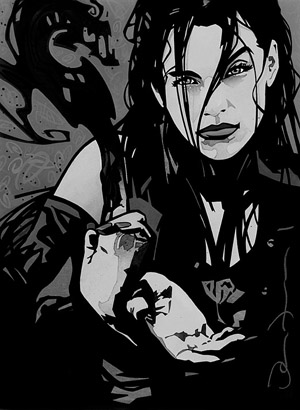
Chapter Two:
Clans and Sects
Lucita:
Well, the trail is hot again. Anatole went out of body again - in some ways it was a relief, because he swears he has to fast for a week before trying it, and that means fewer bodies to dispose of - and this time he claims he's got a lead.
Supposedly - and I'm just transcribing what Anatole said when he came out of it and finished eating, so don't kill the messanger, sweetheart - he's found where the Setites have set up shop. There's a warehouse down along Manayunk that's serving as a temple. He claims to have seen at least three Snakes, including one with a quote-unquote "angelic aura", and about eight ghouls. Most of the ghouls seem to have been created in accordance with the usual Setite philosophy of giving vitae to dumb muscle for protection. They're loaded for bear but hooked on the blood, not the Serpents' philosophy.
Oh, and Anatole also claims that the temple's centerpiece is a severed head on a stick that speaks in tongues and gives prophecies.
Stop laughing, woman, it's better than anything you or I have come up with in the past year. Besides, this description might match one of the Noddite artifacts I've been chasing after a few hundred years - an item called a vathi.
In any case, I think this is worth checking out. I'm going to give Anatole a couple of nights to rest up and eat properly, then we're going to case the warehouse. You can meet us in Camden on Thursday at the usual place - every routes are safer across the river.
Becket
In the first nights, so sires tell their childer, the 13 grandchilder of Caine who survived the strife of the First City begot progeny in their own images, passing on their mystic arts and magical curses. Thus were founded the 13 great clans of Kindred that haunt the world to this very night.
Century followed century, and each clan developed its own history, traditions and lore. As the Jyhad raged and the Antediluvians retreated into the wastelands, the childer of the clans assumed lordship of the night for themselves.
Certainly, all has not been peaceful through the ages. The clans of the Sabbat are whispered to have slain their founders in vile acts of patricide. Over the course of history, some clans, such as the Giovanni, have undergone considerable internecine turmoil, and one clan - the reclusive Salubri - was destroyed outright, its mystic gifts usurped by upstart mortals.
This chapter presents the 13 clans, each claiming descent from a mythical Antediluvian, that comprise the majority the Children of Caine. Because the clans align themselves by sect, we group the clans under the descriptions of the sects to which they adhere. First is covered the Camarilla, keeper of tradition, along with those clans (Brujah, Gangrel, Malkavian, Nosferatu, Toreador, Tremere, Ventrue) who pay it real or fatuous homage. Next is presented the Camarilla's archenemy, the monstrous Sabbat, along with its Lasombra and Tzimisce founders. Finally the four independent clans - Assamite, Followers of Set, Giovanni and Ravnos - stand revealed.
Players may select their characters' clans from one of these 13 templates, or may choose to be Clanless (Caitiff). Each clan has certain distinguishing powers and weaknesses, which a member of that clan automatically adopts.
Clans and Characters
Storytellers are certainly free to limit players' selections of clan. In a Camarilla city, for example, the vast majority of Kindred hail from one of the seven founding clans. While an Assamite or Tzimisce can be worked into such a chronicle, this requires some extra effort on the Storyteller's part, and we encourage Storytellers to be as open or restrictive with clan selection as they feel they need to be.
It is also important to dispel a popular misconception, or prevent it from taking hold in the first place. With a couple of exceptions, clans are simply groupings of Kindred linked by common blood - no less, and certainly no more. One may speak of a certain mannerism or ideal as "so very Brujah" or "typically Ventrue," but clan members are vampires first and foremost. To assume that "he's Toreador, so he must love art" or "she's Assamite, so she must be a cold-hearted killer" is as dangerous as making assumptions about people in the real world based on their ethnicity or religion. Nor do most clans have unwavering "party lines" or all-encompassing agendas to which all members must dutifully adhere - one does not experience the agony of the Embrace and the ravages of the Beast only to spend eternity as a faceless agent/bureaucrat for "the organization." For every "typical" clan member, there are many others who defy conventional wisdom about the clan. Most vampires follow the clan's teachings exactly as far as it suits them, and no farther. Play a vampire, a unique character, not a "clan clone."
Bloodlines
Lineage is very important to the Damned. Vampires descended from particularly illustrious sires often display peculiar characteristics, and a few vampires have deviated from their clan in noteworthy fashion. Most such things can be simulated through simple roleplaying, or through Merits and Flaws (p. 295); for example, while the childer of the mighty Hardestadt might all display the same feeding restriction or obsessively focus on control, they do not differ significantly from Ventrue as a whole. In a few cases, bloodlines actually manifest different Disciplines or weaknesses; these are noted in the "Bloodlines" entry under each clan.
The Camarilla
 The Camarilla came about in an attempt to hold vampire
society together against the power of the Inquisition in the 15th
century. Under its iron guidance, the Tradition of the Masquerade grew from a cautious suggestion to the guiding principle of
Kindred unlife. Even today, the Camarilla concerns iteself with
the enforcement of the Masquerade, maintaining harmony
between Kindred and kine, and battling the Sabbat, which it
views as its direct opponent.
The Camarilla came about in an attempt to hold vampire
society together against the power of the Inquisition in the 15th
century. Under its iron guidance, the Tradition of the Masquerade grew from a cautious suggestion to the guiding principle of
Kindred unlife. Even today, the Camarilla concerns iteself with
the enforcement of the Masquerade, maintaining harmony
between Kindred and kine, and battling the Sabbat, which it
views as its direct opponent.
The Camarilla touts itself as the society of the Kindred, and it is partially correct. It is the largest sect of undead on the planet. Almost any vampire, regardless of lineage, may claim membership in the Camarilla. In truth, the Camarilla asserts that all vampires are already under its aegis, regardless of the wishes of the vampires in question.
Over the years, the sect has attempted to extend its influence over other areas of vampire life, and each time has had its hands roundly slapped for its insolence. Princes brook no interference in the affairs of their cities, while the ancient Methuselahs scoff at the temerity of the younglings who think they can play at Jyhad. In the end, the Camarilla's influence begins and with protecting the Masquerade and ensuring Kindred-kine coexistence.
The Camarilla claims to allow membership to any interested vampires, regardless of bloodline, but the vast majority represent the seven founding clans. It was their members who founded the sect, and only these clans regularly make up the Camarilla's governing Inner Circle. Other vampires of different bloodlines may attend conclaves and meetings, but their voices frequently go unheard.
After the Anarch Revolt, the Camarilla placed itself squarely against the Sabbat, seeing itself as the only means to hold the war packs at bay. The Camarilla alone upheld the Masquerade and protected its own, while the Sabbat would as soon throw away the Traditions and everything sacred to sustain its paranoid dreams of Gehenna. Dissent is a luxury that cannot be afforded during times of war, and the Camarilla believes quite firmly that those who are not with the sect must be against it. However, for the frightened elders who make up the higher echelons, the Camarilla has quite a few enemies.
In these modern nights, the Camarilla is hardly the monolith that its proponents advertise it to be. Elders cling to their positions, refusing to relinquish them to those who have reached the age of consideration. Younger vampires feel left out of an organization they are expected to uphold, but which offers little to no reward for their efforts save the threat of punishment if they fail. Ancillae are trapped in the middle, unable to turn to either the younger or older vampires; taking up with the neonates means relegation to the lower strata of power, while attempting to fall in with the elders risks the appearance of overstepping boundaries and being crushed for insolence.
Many elders in the Camarilla's upper echelons find themselves in the position of relics. A good many are unwilling or unable pick up the new technology that the young ones have mastered - cellular phones, laptop computers, Kevlar, phosphorus grenaded, sun lamps, Dragonsbreath rounds - and in the modern world, barely able to use a telephone or radio leaves these elders at a distinct disadvantage. Should they relinquish their positions and find themselves outside the halls of power, they become targets as their personal might lessens without the Camarilla behind it. A few gangs of ancillae with diablerie on their minds and the latest technology in their hands, and an elder might well find himself becoming obsolete in more ways than one. Therefore, in preemptive strikes of paranoia run rampant, the elders kill the best and brightest who could some night pose a threat. The result is an organization that is cannibalizing itself, and one night it might regret the mistake.
The View from Without
The Sabbat
Camarilla? The relic of frightened elders who prey upon their childer and cling to dreams of glory that are long gone.
The Independents
Their overwhelming ideal of "for the good of Kindred" leads them to sweep you along with their plans, and if you don't want to go, then you must be the enemy. There's a reason why we prefer to stay on our own side of the street.
The Justicars
These seven mighty vampires are the judges appointed by the Inner Circle to be the Camarilla's eyes, hands and, if necessary, fists. Justicars have the only true authority across the Camarilla and all Kindred, with the exception of the Inner Circle. They alone have the ultimate power to adjudicate matters regarding the Traditions. No one is considered to be above them in this. It is Justicars who decide the punishment for those who have violated the Traditions on a widespread level; the one being judged may not expect mercy. Justicars are supposed to call for a conclave when they wish to pass judgment, but over the years this lapsed as they grew in power. Justicars have the authority to call a conclave at any time, either to confirm a ruling or to make certain decisions that one justicar alone does not wish to burden himself with.
A justicar serves for 13 years, and her actions may be challenged only by another justicar. If things grow heated, a conclave may be called by the combatants or by another justicar to resolve the dispute. When rival justicars decide to start battling it out, few Kindred are safe from being used and abused in the ensuing struggle.
Many vampires, elders and younglings alike, resent the power the justicars wield, and certainly none care for the abuses that can come with it. However, very few would dream of openly taking them on, due to their immense age and resources. A shocking exception occurred in 1997, as the mighty Nosferatu justicar Petrodon was murdered by parties unknown. What movement of the Jyhad lay behind this assassination, or whether it is a precursor of further strikes against the justicars, is unknown.
The Archons
Each justicar selects a number of minions, known as archons, to act in his name as suits his purposes. If the justicars are the hands of the Inner Circle, then the archons are the fingers on those hands. No justicar can be everywhere he might need, or wish, to be, and archons can often make certain his presence is felt if not seen. Archons, although they are part of the Camarilla hierarchy of power, are not so far removed from typical Kindred unlife that they cannot observe it or gain the trust of other Kindred outside the hierarchy; this makes them ideal watchers. Some Kindred attempt to gain favorable attention from an archon, in the hope that she will mention them to her master. Such attempts often backfire, as continued efforts to curry favor are more likely to encourage suspicion.
Archons are typically chosen from the upper ranks of ancillae and occasionally elders of lesser station. Such a prestigious appointment can make or break a Kindred's career in the halls of power. Justicars occasionally choose archons to carry out specific missions, and sometimes prefer political savvy, insight and skill over recognizability.
An archon's position typically lasts for as long as a justicar wishes to retain her, or the length of the justicar's tenure. It is not unheard of for a new justicar to retain an archon who served with his predecessor, provided the archon understands to whom she now owes allegiance. Most times, though, a justicar prefers to select an entirely new staff, particularly if the last one left under strange or bitter circumstances.
Conclaves
Conclaves are the greatest events in Camarilla politics - at least the greatest events to which every vampire can be privy. One American Kindred described conclave to his childe as "a House Committee session, the Supreme Court and a tent revival all rolled up into one." A conclave serves as the highest court of Camarilla Kindred, a legislative session for considering and deciding future Camarilla policy, and a reaffirmation of the Camarilla as the guiding principle behind the Masquerade and Kindred-kine relations.
Any and all Kindred who hear the call to conclave are welcome to attend. These events can last anywhere from a few hours to several weeks. A city hosting a conclave may never be aware of what is occurring, except that many hotels are suddenly booked up. Naturally, conclaves are perilous undertakings; so many vampires (many of them potent-blooded elders) in a single location presents a tempting target for Sabbat or diablerists. Many attendees might not know where the conclave will be held until a few nights before the event itself.
Only justicars may call conclaves, and only when needed, due to logistical concerns. The conclave is usually held in the geographic region most concerned with the issue at hand, or more centrally if the problem is widespread. The vampires who attend the conclave are referred to as the assembly, and any may speak, provided they are supported by at least two other members. Each member of the assembly receives a single vote regarding the issue.
Conclaves are typically called with regard to powerful individuals, such as princes, or serious breaches of the Traditions. Any Kindred may bring a grievance to the conclave and expect to have it addressed. A prince may request more leeway regarding the Traditions to deal with Sabbat or anarchs, or to have a destructive quarrel between two powerful elders mediated. The conclave may call blood hunts against individuals, including princes, or have particularly powerful princes removed from office. The right to depose princes is one the Camarilla keeps a tight leash on, and while a justicar may not remove a prince, she may call a conclave for the sole purpose of forcing a prince's abdication.
Any actions that would result in a serious breach of the Traditions must be discussed and agreed upon by the conclave to avoid punishment in the future. The conclave interprets the Six Traditions and may add amendments or enact precedents. Many princes have come to demand that certain powers, which could be breaches of Tradition, be given them in dealing with unruly Kindred.
A Kindred on trial at a conclave may challenge the ruling by requesting an ordeal. These ordeals can be quite literally almost any exacting task or quest, with a time limit for completion. If the ordeal is not completed to satisfaction, the justicar may impose any penalty. Should the crime be considered too heinous to allow the accused an ordeal, she may be challenged to ritual combat by one of her accusers. As with the ordeal, almost anything can happen: ritual weapons, both opponents blindfolded, forbiddance of Disciplines, etc.
After a conclave, princes often reward those who voted in their favor and punish those who did not. Some vampires, in anticipation of a prince's anger, settle their affairs and seek out new living arrangements at the conclave. Others take the opportunity to curry as much favor as possible, hoping that their "loyalty" will be rewarded.
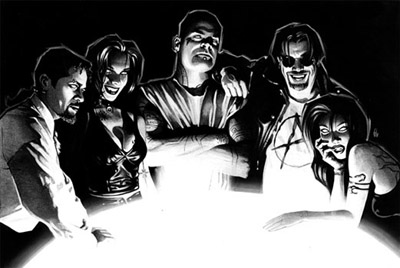 Not every conclave called is an emergency meeting. Some
justicars arrange for annual conclaves allowing all Kindred who
choose to attend an opportunity to meet and talk over the year's
business. For the past decade, the Toreador justicar has called a conclave on the weekend closest to Halloween, while another
takes place in New Orleans every three years. These are opportunities for Camarilla vampires to discuss business that relates to
the sect as a whole, to fraternize with others of their station and
clan, and simply to socialize with new faces and old acquaintances. However, with the increasing boldness of the sect's many
enemies, many Kindred fear that one of these conclaves will
provide a perfect target for a retaliatory strike.
Not every conclave called is an emergency meeting. Some
justicars arrange for annual conclaves allowing all Kindred who
choose to attend an opportunity to meet and talk over the year's
business. For the past decade, the Toreador justicar has called a conclave on the weekend closest to Halloween, while another
takes place in New Orleans every three years. These are opportunities for Camarilla vampires to discuss business that relates to
the sect as a whole, to fraternize with others of their station and
clan, and simply to socialize with new faces and old acquaintances. However, with the increasing boldness of the sect's many
enemies, many Kindred fear that one of these conclaves will
provide a perfect target for a retaliatory strike.
The Inner Circle
The true hub of the Camarilla, this group meets in Venice once every 13 years to plan out the business and direction of vampire society - as much as any group can presume to dictate the doings of a race of immortal predators. Every clan is permitted one representative, usually the eldest member of the clan, as only the eldest may cast the clan's vote. Others may be brought to the meeting and allowed to speak, but in the end only the elders may vote.
One of the Circle's main purposes is the appointment of justicars, one for each of the seven Camarilla clans. Appointment is a long, drawn-out process, as each clan seeks to get its best in the plum spots. Often, when the shouting is over, the losers end up with young or relatively weak justicars who are ignored for their 13-year stints. Those who are eventually appointed are most often compromise candidates, or even obscure Kindred who the Circle believes can be manipulated. These latter types sometimes display a surprising amount of initiative, and may even bite the hand that feeds them.
Brujah
Clan Brujah is largely composed of rebels, both with and withous causes. Individualistic, outspoken and turbulent, Brujah hold social change near to their undead hearts, and the clan's ranks contain some of the most violent of the Camarilla kindred. Most other vampires perceive the Brujah as nothing more than punks and miscreants, but the truth of the matter is that genuine passion lies behind their polemics.
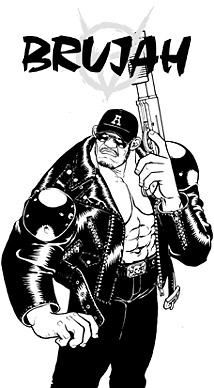 Brujah Kindred adopt pet passions and causes, which they
support with volume and vitriol. Some Brujah follow charismatic
members of their clan, while others prefer stances of blatant, defiant
individualism. The clan claims a history rich with warrior-poets, and
it has adapted this concept into the modern night; many Brujah are
glad to have an opportunity to speak their minds, then indulge in a
bit of destruction afterward to illustrate their points.
Brujah Kindred adopt pet passions and causes, which they
support with volume and vitriol. Some Brujah follow charismatic
members of their clan, while others prefer stances of blatant, defiant
individualism. The clan claims a history rich with warrior-poets, and
it has adapted this concept into the modern night; many Brujah are
glad to have an opportunity to speak their minds, then indulge in a
bit of destruction afterward to illustrate their points.
The Rabble's espousal of change unites them, albeit tenuously, in their nightly crusades. Given a common enemy, Brujah with vastly differing ideals will join side by side to oppose their foe. After that foe is defeated, however, all bets are off and it's back to business as usual. A common Brujah theme involves the foundation of a Kindred "Utopia," or the re-creation of a mythical one from nights past, though each Brujah vampire has a different idea of what said Utopia is.
Brujah rely on chaotic behavior and upheaval to get their ideas across, and the Rabble are allowed a certain leeway that other clans do not have. In fact, Bmjah are almost expected, to be incoherent and bellicose; this stereotype works to the advantage of many eloquent, well-spoken members of the clan, who have no need to resort to violence when making their arguments.
 Respected for their martialry and
readiness to rally under a banner, the
Brujah are the physical strength of the
Camarilla. Of late, however, many Rabble neonates see their role in the Camarilla as an institution unto
itself, and more than a little unrest circulates among the
clan. Other Kindred believe that the Brujah would be the
first to leave the Camarilla. The Brujah believe it, too...
Respected for their martialry and
readiness to rally under a banner, the
Brujah are the physical strength of the
Camarilla. Of late, however, many Rabble neonates see their role in the Camarilla as an institution unto
itself, and more than a little unrest circulates among the
clan. Other Kindred believe that the Brujah would be the
first to leave the Camarilla. The Brujah believe it, too...
Nickname: Rabble
Sect: Rhetoric aside, most Brujah are in the Camarilla. Brujah Kindred also support the anarchs, arguably more so than the Camarilla. Indeed, the anarchs have more Brujah than members of all other clans combined.
Appearance: Brujah vary widely in appearance, though many adopt radical styles and bold looks. If dismissive stereotypes are to be believed, the typical Brujah wears a biker jacket, tattered jeans, combat boots and a fearsome array of high-maintenance hair. In truth, few Brujah fit this image. Youthful, fashion-forward dress and noteworthy hairstyles are indeed found among many Brujah, but others favor tasteful ward- robes that encourage others to take them seriously. In the end, a Bmjah's appearance often suggests his attitudes: A skinhead bravo is likely an open rebel or anarchist, while a bespectacled pedant in a tweed suit is probably a reformationist or liberal. It should be noted, however, that given the Brujah penchant for nonconformity, any assumption of ideals based on appearance could be potentially dangerous. Brujah look how they want.
Haven: Wherever they damn well please. Are you going to tell them to leave?
More so than any other clan, the Brujah keep the company of other vampires, and one haven might house an entire brood. Brujah Kindred also keep multiple gatehouses and boltholes, as their conflict-driven existences often make single locations: inhospitable. Some Brujah neonates even carry on: the urban practice of the home invasion, Dominating ar killing a home's occupants and taking over. Like other: pursuits, however, home invasions rarely sustain the Rabble's interest, and the vampires often move on once they grow bored with the locale.
Background: Brujah prefer those who espouse change in one form or another, and often recruit from college campuses, political groups or oppressed minorities. Young Brujah may hail from any background and often have a pet Cause or issue of burning personal importance. All types of dissidents find their way into the ranks of the Brujah, from bomb-throwing biker anarchists to vociferous fascists to nihilistic radicals. This is, of course, part of the reason the clan is so disorganized - hatted between Brujah: is often more bitter than hatred for those whom they mutually: oppose.
Character Creation: Brujah often have violent, criminal concepts, but they are as likely to be intellectual or socially adept. Natures and Demeanors tend to be aggressive and similar, as Brujah wear their emotions on their sleeves (when they have sleeves...). Physically predisposed characters are predominant among the clan, but some favor Mental Attributes. Likewise, Skills are favored, with Knowledges running a close second. Any Backgrounds may be appropriate to a Brujah character, though many in the clan cultivate Contacts, Allies and Herd. Very few Brujah claim Mentors.
Clan Disciplines: Celerity, Potence, Presence
Weaknesses: Fiery passion is at once the Brujah's blessing and curse. Though they are quick to adopt a cause, they are equally as quick to fall to frenzy. Of course, the Brujah rabidly deny this penchant for excitement, and become quite hostile when the issue is raised. The difficulties of rolls to resist frenzy (p. 228) are two higher than normal for members of Clan Brujah.
Organization: Clan Brujah is far too fractious and torn by internecine conflict to have true organization, and the clan never meets formally. Two conventions the clan does support universally are the Rant and the Rave. Rants are just that: informal meetings of Brujah (and other insurgents, Kindred and kine) at which anyone who can scream loudly enough can have her opinions heard. Raves, named after the all-night techno dance parties started in England, are social gatherings in the guise of huge-scale musical or entertainment events. One usually leads to another, and clues to the locations of the events are often hidden in the media of the gathering in progress. These meetings almost invariably degenerate into riots, further eroding the organizational base of the clan.
Bloodlines: Brujah antitribu of the Sabbat are, ironically. almost bastions of stability. In a sect devoted to chaos and destruction, the Brujah are the most dependable of the monsters who populate the Sabbat. They are viewed less as impassioned rebels and more as brutal shock troops. Sabbat Brujah tend to be less intelligent and discerning than their Camarilla brothers anc sisters. Their causes fall by the wayside at the promise of new havoc to wreak.
Quote: Think for yourself, or you're better off dead. Either way, I'm satisfied.
Stereotypes
Assamite: They fell too far from the tree to have a place in our world.
Followers of Set: Oily bastards. I have to wonder what they're hiding if what they don't mind showing you is so heinous.
Gangrel: They fight well, and they're willing to go to the wall for what they believe in. Maybe we'll join them if they leave the Camarilla. Or maybe we'll leave first....
Giovanni: I'm not sure what their angle is, but if it involves dealing with the dead, it can't be good.
Lasombra: Swing first and ask questions later when dealing with these Kindred, or they'll talk you into slitting your own throat.
Malkavian: They're completely batshit, but at least they don't immediately hate you based on who you are.
Nosferatu: Geh! Still, they hit as hard as we do, and they know everything, so it's probably best just to be civil with them. After all, the poor bastards need all the friends they can get.
Ravnos: Touch my shit and I'll rip out your fucking heart, Eurotrash.
Toreador: Have any of these Kindred ever actually done anything? Or do they just snipe at each other every night?
Tremere: It's like someone Embraced a bunch of D&D geeks and told them their spells were real.
Tzimisce: Take 'em or leave 'em. The one I met seemed more trustworthy than most of my Camarilla "Kindred," but I can't help but think it's because she wanted something.
Ventrue: These fascist assholes are complete hypocrites, just like anyone else with a bit of power to throw around. My sire says they fucked us over a while back. Paybacks are hell, motherfuckers.
Caitiff: I have a couple of friends among the Clanless. We are the only clan that treats these unfortunates as equals.
Camarilla: The lesser of two evils - at least they're better organized than the Sabbat.
Sabbat: Then again, there's something to be said for decisive action.
Gangrel
Of all vampires, the Gangrel are perhaps closest to their inner nature These nomadic loners spurn the constraints of society, comfort of the wilderness. How they avoid the wrath of the werewofves is unknown; perhaps it has something to do with the fact that the Gangrel are themselves shapeshifters. When a mortal speaks of a vampire changing into a wolf or a bat, she is probably speaking of a Gangrel.
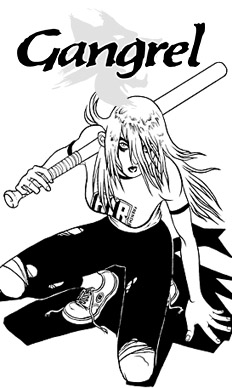 Like the Brujah, Gangrel are fierce warriors; unlike the Brujah,
Gangrel ferocity does not stem from anarchic rage, but from
animalistic instinct. They are among the most predatory Kindred, and love to lose themselves in the thrill of the
hunt. Gangrel have a keen understanding of the
Beast in their souls, and prefer to spend their
nights in communion with the animals whom
they so emulate. Indeed, Gangrel are so
attuned to their Beasts that, after
losing themselves to frenzy, animalistic features often appear on their bodies.
Like the Brujah, Gangrel are fierce warriors; unlike the Brujah,
Gangrel ferocity does not stem from anarchic rage, but from
animalistic instinct. They are among the most predatory Kindred, and love to lose themselves in the thrill of the
hunt. Gangrel have a keen understanding of the
Beast in their souls, and prefer to spend their
nights in communion with the animals whom
they so emulate. Indeed, Gangrel are so
attuned to their Beasts that, after
losing themselves to frenzy, animalistic features often appear on their bodies.
The clan itself has little contact with, or regard for, the rest of the Kindred.
This might be due to a desire to avoid the snares of the Jyhad, but is more likely the product of simple disinterest. Certainly, Gangrel are popularly viewed as quiet, taciturn and reclusive. Although there is no more truth to this than there is to any other stereotype, the clan as a whole displays little of the ostentation found among lines such as the Toreador or Ventrue.
 Gangrel are closely tied to the Rom, or Gypsies, adopting much of that
culture's speech patterns and manner isms. Rumors speculate that
the Rom are in fact descended from the
Antediluvian who founded the Gangrel line. As such, say
the rumors, any Kindred who harms or Embraces a Gypsy will suffer
the wrath of the Ancient. Obviously, the vampires of Clan Ravnos ignore this fabled prohibition, and Gangrel and Ravnos harbor an ages-old
hatred for each other.
Gangrel are closely tied to the Rom, or Gypsies, adopting much of that
culture's speech patterns and manner isms. Rumors speculate that
the Rom are in fact descended from the
Antediluvian who founded the Gangrel line. As such, say
the rumors, any Kindred who harms or Embraces a Gypsy will suffer
the wrath of the Ancient. Obviously, the vampires of Clan Ravnos ignore this fabled prohibition, and Gangrel and Ravnos harbor an ages-old
hatred for each other.
Nickname: Outlanders
Sect: Clan Gangrel is nominally in the Camarilla, though a fair number of Sabbat Gangrel exist as well. Most Gangrel care little for sect, and rumblings of outright secession from the Camarilla have made the rounds at recent Gangrel Gathers.
Appearance: Gangrel's harsh unlifestyle and lack of interest in fashion often make them seem rugged and wild. Couple this with the animal features common among the clan, and Gangrel sometimes appear downright frightening. Some mortals and Kindred find a certain predatory beauty in the Gangrel, though this can lead to a dangerous misjudgment of the Gangrel's intentions.
Haven: Gangrel often make no permanent havens, steeping wherever they can find shelter from the sun. Gangrel with sufficient mastery of the Protean Discipline sleep in the very earth, lairing in parks and other spots of natural terrain. Although many Gangrel prefer to lair in the wild to travel from place to place, they are as vulnerable to attack by werewolves as other Kindred are, and so they are often forced to remain in the city's confines.
Background: Gangrel Embrace for a variey of reasons, as do most Kindred, but do not pass on the Curse lightly or commonly. If a generalization must be made, it could by said that Gangrel prefer to Embrace loners, those who have the physical and emotional resiliency to survive the shock of' the Change. The sire's training, what little there is, tends to br gruff and harsh; most Gangrel must discover the vagaries of unlife largely on their own.
Character Creation: Gangrel often have similar Natures and Demeanors, as they rarely rely on subterfuge to get their way. Physical Attributes and Talents or Skills are common among Gangrel. They often have Allies (Gypsies) or Mentor as Background, but rarely have high levels of Influence or Resources.
Clan Disciplines: Animalism, Fortitude, Protean
Weaknesses: Gangrel are very close to the Beast Within; as they succumb to it, it leaves its mark on their bodies. Every time a Gangrel frenzies, she gains an animalistic feature. This feature is determined by the player and Storyteller; it might be tufted ears, a pelt, a tail, catlike eyes, a snarling voice, tusks, even scales or feathers. Every five such features acquired permanently reduce one of the Gangrel's Social Attributes by one.
Organization: Gangrel have no true organization to speak of. Vampires of great age and great deeds are typically shown respect, though the young are by no means subservient. Outlanders occasionally meet ill groups known as "Gathers"; at these festivals, vampires dance, feast and tell stories of their travels Disputes between Gangrel are often settled through ritual combat to first blood or submission; while savage, these fights rarely result in the loser's Final Death. Gangrel commonly hunt alone though occasionally two or more Gangrel unite in a coterie of sorts (a "pride" or "pack").
Bloodlines: Two bloodlines exist among the Sabbat: the Country Gangrel (similar in most ways to the main branch of the clan) and City Gangrel (whose Disciplines are Celerity, Obfuscate and Protean). Both types are found only among the Sabbat.
Quote: You provided worthy sport, mortal. Now, though, the chase is ended.
Stereotypes
Assamite: Jackals playing at being lions.
Brujah: So much fury for so little gain.
Followers of Set: They stink of disease worse than most of us do. Then again, we're all corpses.
Giovanni: Who cares? What do they have to do with us?
Lasombra: Honest bastards. Competent bastards. Bastards nonetheless.
Malkavian: Either they know the greatest secrets, or they've played us all for fools. Whichever, I keep my distance.
Nosferatu: Wise observers and useful allies. Still, I wouldn't chose to lair in a pest-hole.
Ravnos: That these honorless bitches dare to claim kinship with us is an insult.
Toreador: Pointless waste.
Tremere: They are not vampires, try though they might. The reckoning has merely been postponed.
Tzimisce: Pointless waste.
Ventrue: Their foolish power-games keep the others preoccupied, and so we tolerate them for now.
Caitiff: We bear the blame for many of these wretches. Ultimately, though, they must make of unlife what they can.
Camarilla: A blood-wind harbinges the coming hurricane; perhaps it's time to leave the shack before it crashes down arouad us.
Sabbat: We stay and go, spare and kill as we choose, O Black Hand.
Malkavian
Even other Damned fear the Malkavians. The cursed blood of their clan has polluted their minds, with the result that every last Malkavian across the world is incurably insane. What's worse, a Malkavian's madness can take nearly any form, from overpowering homicidal tendencies to near-catatonia. In many cases, there's no way to tell a Malkavian apart from the "sane" members of other clans. Those few whose psychoses are immediately obvious are among the most terrifying vampires to stalk the streets.
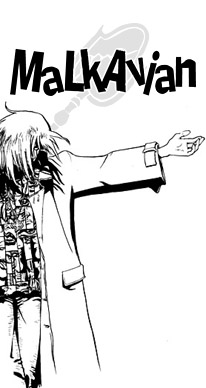 For as long as even the eldest Cainites can remember, the Malkavians have always stirred
Kindred society with their passage. Although the clan has instigated no great wars nor toppled
mortal governments (at least, to the best of their fellow vampires' knowledge), the very presence
of a Malkavian works a subtle change on a city. Chaos nips at the Lunatics' heels, and those who
associate with even the most well-meaning Malkavian often find their lives or unlives altered by
the Cainite's madness.
For as long as even the eldest Cainites can remember, the Malkavians have always stirred
Kindred society with their passage. Although the clan has instigated no great wars nor toppled
mortal governments (at least, to the best of their fellow vampires' knowledge), the very presence
of a Malkavian works a subtle change on a city. Chaos nips at the Lunatics' heels, and those who
associate with even the most well-meaning Malkavian often find their lives or unlives altered by
the Cainite's madness.
Recently, the Malkavians executed their grandest "prank" of all. None can say whether it was worked in a great Malkavian Parliament held somewhere in an isolated European village, or on a bleak and forgotten moor somewhere far from the cities. A few stories speak of a epidemic of contagious dementia exploding among those of Malkav's blood. Whatever the cause, Malkavians across the world have begun displaying a new, dangerous edge to their madness, accompanied by bizarre events in Kindred cities around the world. A longstanding Malkavian conceit holds the Jyhad to be a joke instigated by the founder of the clan; some Kindred wonder if, in fact, Malkavians have played the joke on them all along.
 None can say what exactly makes the Lunatics so dangerous. Certainly, their madness
often frees them from fear of pain or Final Death. More than a few demonstrate horrifying
murderous urges or a complete lack of emotion, including compassion. But most convincingly, the Malkavians are free from the confines of rationality and may do whatever they
like - and this freedom is coupled with an uncanny insight, a strange wisdom that cannot
be perceived by the sane. The Malkavians possess a dark intellect that is often - and
increasingly - set to frightening purposes.
None can say what exactly makes the Lunatics so dangerous. Certainly, their madness
often frees them from fear of pain or Final Death. More than a few demonstrate horrifying
murderous urges or a complete lack of emotion, including compassion. But most convincingly, the Malkavians are free from the confines of rationality and may do whatever they
like - and this freedom is coupled with an uncanny insight, a strange wisdom that cannot
be perceived by the sane. The Malkavians possess a dark intellect that is often - and
increasingly - set to frightening purposes.
Nickname: Lunatics
Sect: The Malkavians as a clan have an... understanding... with the Camarilla. They also populate the Sabbat in lesser numbers, where they frighten even their packmates with their psychotic displays. But when it all comes down to it, their true loyalties likely transcend sects. When Gehenna arrives, nobody can say for sure where the Malkavians will stand.
Appearance: Malkavians run the gamut from terrifyingly psychotic to convincingly ordinary in every way - sometimes both at once. Just like serial killers, they could be anyone - the scruffy bum talking to himself, the pleasant but quiet neighbor, the borderline-suicidal musician. These vampires are capable of great subtlety, and rarely show anyone a face other than the one they want people to see.
Haven: The Lunatics by and large take whatever shelter they like, although more than a few find aging hospitals and poorly funded asylums to their tastes. Many seem to enjoy the company of desperate mortals, and prefer slums and institutions to more secluded havens.
Background: Malkavians take their childer from all walks of life and for all number of reasons. Anyone can be chosen to further a sire's twisted purposes, although most Lunatics prefer Embracing those already close to (or subject to) madness. Most other vampires believe that the Malkavians Embrace their childer on a whim; however, virtually all Lunatics discover themselves subtly championing some barely perceptible "purpose," the full extent of which none - not even their sires - can properly fathom.
Character Creation: Malkavians come in all shapes and flavors, but many have primary Mental Attributes, befitting the clan's reputation for wisdom and insight. Apart from that, it's anyone's guess just what Traits a Malkavian may manifest - with the diversity of their concepts and backgrounds, these mad vampires could be anyone. Anywhere.
Clan Disciplines: Auspex, Dementation, Obfuscate.
Weaknesses: Every last vampire of Malkav's blood is irredeemably insane in some form or another. Some attribute this to a curse of the blood, while other Lunatics actually call it a special blessing, a gift of insight. When a Malkavian character created, the player must choose at least one deragement (see p. 222) for that character at the time of the Embrace; this derangement can be temporarily fought with Willpower, but can never be permanently overcome.
Organization: The hierarchy of the Malkavians, if it exists at all, defies description. Most are usually conent to let one another do as they like from night to night. But now and again, in times of great need, Malkavians demonstrate an uncanny ability to act in unison, wen without any apparent leadership - and sometimes even without any apparent communication. As one, they arise from their desolate haunts; as one, they fall on the problem at hand. And when it is a problem no longer, they drift back to their usual routines. If the Malkavians indulge in any form of machinations as a clan, they are incomprehensible to outsiders - which may be a blessing.
Bloodlines: Before the Dementation Discipline spread contagiously, throughout the clan (in 1997 or so), a great number of Malkavians expressed their mind-warping talents through the use of the Dominate Discipline. A few Malkavians weren't caught in the redoubled tide of insanity that swept the clan, and still possess that power in lieu of Dementation. The rest of the clan pays these offshoots no particular notice; indeed, with only a few exceptions Malkavians don't differentiate between this bloodline and the clan proper at all.
Quote: Laugh if you like. Doesn't matter. Assume that you're so much smarter than the poor, broken lunatic. Doesn't matter. But think about this: You're a dead thing, same as me. You died and were reborn...as this. What makes you and me different? Simple - I remember what I saw when I was full anc truly dead. You'd be mad, too.
Stereotypes
Assamite: So. That's done, then.
Brujah: I want to like your average Brujah, but his skull's just so damned thick that he can't crack it open and get at the good stuff he doesn't even know he's got in there. So forget him.
Followers of Set: I can't understand them. Aren't they mad yet? Don't they understand what they've seen? Goddamn. Goddamn....
Gangrel: They aren't animals, no matter people say. Look under the skin of the corpse, then loon under the layer of beast-thought, and what do you find? A secret worse then man, corpse or animal? Yes? Yes!
Giovanni: What price did these idiots pay for their inside gossip? It's yesterday's news, anybody can find if it they listen, and the Giovanni have sold their souls for it so they can call it their "biig secret." Feh.
Lasombra: (An explosion of helpless, hysterical giggling, swelling up into full-throated laughter.)
Nosferatu: They just about mortified enough of their own flesh to blast through the wall of delusion from the other side of perception. They're onto something but who knows if there'll be anything left of them when they get there?
Ravnos: Call us deluded? Go look at Ravnos for a while.
Toreador: Puppets who pull their own strings, or offer them to anybody who wants to make them dance.
Tremere: They. Are on. To us.
Tzimisce: Penguins. They decided they like the water so much, they traded in their wings for flippers. And they were so close...
Ventrue: They will never accept it, no matter who tries to hand it to 'em. Well, don't say we didn't warn you.
Caitiff: From their number will the Herald emerge.
Camarilla: It's like The Haunting of Hill House, but you can't wait for the ending, where they wake up and realize what they are!
Sabbat: It's more fun when you don't try so hard.
Nosferatu
Caine's childer are called "The Damned," and no vampires embofy this more fully than the wretches of Clan Nosferatu. While other vampires still look human and may travel in mortal society, Nosferatu are twisted and deformed by the curse of vampirism. Other Kindred speak shudderingly of Caine placing a mark upon the entire clan for the monstrous deeds of its Antediluvian founder. As such, Nosferatu find themselves loathed and ostracized by the other Children ofCaine, who consider them disgusting and interact with them only when they must.
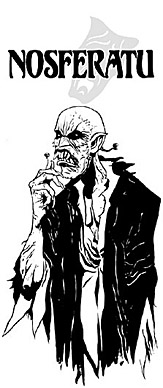 Following the Embrace, Nosferatu childer suffer an agonizing transformation as,
over the subsequent weeks, they warp from humans into hideous monsters. The horror .
of the physical devolution often produces an accompanying psychological trauma.
Unable to walk among the kine, Nosferatu must dwell in subterranean sewers and
catacombs forever after.
Following the Embrace, Nosferatu childer suffer an agonizing transformation as,
over the subsequent weeks, they warp from humans into hideous monsters. The horror .
of the physical devolution often produces an accompanying psychological trauma.
Unable to walk among the kine, Nosferatu must dwell in subterranean sewers and
catacombs forever after.
Nosferatu often choose physically or emotionally twisted mortals for the Embrace, seeing in the curse of vampirism a possible means of redemption for the mortals. Amazingly, there seems to be some merit to this belief. Many Nosferatu are surprisingly levelheaded and practical, avoiding the obsessions, fits and rages of their fairer brethren. Not that this makes the Sewer Rats particularly pleasant to be around; indeed, some Nosferatu come to delight in the shock and horror their grotesque appearances inspire in others.
Nosferatu are survivors par excellence. Few creatures, mortal or vampire, know a city's back alleys and dark corners like the Nosferatu do. Additionally, Nosferatu have mastered the crafts of sneaking and eavesdropping; they make a point of keeping up with current gossip and affairs, not merely for pleasure, but for survival. Information brokers without peer, they can command high prices for their knowledge. Using their Obfuscate Discipline, Nosferatu make a point of listening to others' conversations from hiding, or sitting in on "secret" meetings. If a Kindred wishes to learn about the doings and denizens of the city, she would do well to consult the Nosferatu.
 Finally, millennia of shared deformity and abuse have fostered
strong bonds among the monsters. Nosferatu forego the squabbling
and feuds ubiquitous to the other clans, preferring to work in unison.
They treat each other with meticulous politeness and freely share
information among themselves. To mess with one Nosferatu is to
mess with them all - and that can get messy indeed....
Finally, millennia of shared deformity and abuse have fostered
strong bonds among the monsters. Nosferatu forego the squabbling
and feuds ubiquitous to the other clans, preferring to work in unison.
They treat each other with meticulous politeness and freely share
information among themselves. To mess with one Nosferatu is to
mess with them all - and that can get messy indeed....
Nickname: Sewer Rats
Sect: Surprisingly, the clan as a whole belongs to the Camarilla, despite obvious difficulties with upholding the Masquerade. Perhaps they value the safety of membership; perhaps they simply want the other clans within observing distance. Still, a fair number of Nosferatu are in the Sabbat or simply consider themselves autarkis (of no sect).
Appearance: No two Nosferatu look precisely alike, but all are hideous. Gaping fang-filled maws, discolorations, tumors, holes in place of noses, batlike ears, sloping bald heads, twisted spines, claws, wrinkled hides, pustulent sores and webbed fingers are just a few possible deformities possessed by Nosferatu. An existence in sewers and crypts tends to ensure that most Nosferatu smell about as good as they look.
Haven: Their disfigurement forces most Nosferatu to take havens far from the eyes of mortals, in graveyards, abandoned warehouses and cellars. In large cities, entire broods of Nosferatu lair in sewers and subway systems. These "kingdoms," particularly the older ones, are often much more extensive than mortals or Kindred are aware - subterranean labyrinths stretching deep into the darkness and guarded by monstrous ghouls. Even princes treat warily with the Nosferatu kingdoms.
Background: Nosferatu choose their progeny from society castoffs: derelicts, the mentally ill and the hopelessly antisocial. Occasionally, a vindictive Nosferatu chooses beautiful, vain mortal, then watch gleefully as the Curse takes hold.
Character Creation: Nosferatu can have often come from loner, outsider or drifter Mental Attributes are often primary (Social other than tertiary!). Stealth is highly prized amond the clan. while Survival allows a Sewer Rat to find shelter in the blighted zones Nosferatu favor. Nosferatu occasionally take retainers in the form of ghoul animals, or even a human ally or two, but Backgrounds are rarely predominant among the clan.
Clan Disciplines: Animalism, Obfuscate, Potence
Weaknesses: As mentioned, Nosferatu are absolutely loath-some to look at. All Nosferatu have Appearance ratings as zero - cross the automatic dot right off the character sheet. Nor many they improve Appearance with experience points. Most Social actions based on first impressions, except intimidation and the like, fail automatically.
Organization: While Nosferatu do not have the rigid protocols that mark clans such as Tremere and Ventrue, their shared deformity creates an exceptional clan unity. Shunned and reviled by other creatures, Nosferatu stick together out of the equal parts necessity and loneliness.
Bloodlines: Like many other calns, Nosferatu has an antitribu analog in the Sabbat, though this branch does not differ greatly from the ruck and run of the clan save in ideology. Descendants of certain sires sometimes bear "signature" deformities, but few differ in any signincant fashion.
Quote: Come here, little boy, howsabout a kiss? [phlegmy, wheezing hack] Whazza matter? Big bad gangbanger's scared now? Don't so much like being a victim, heh? Well, get used to it, cuz you ain't seen the half of it!
Stereotypes
Assamite: This is bad. This is straight-up, fucked-up bad. Roll around in sewage; maybe they won't wanna bite you.
Brujah: They talk a lot about equality and egalitarianism and other bullshit, but they flinch like the rest.
Followers of Set: What have they got that we need? Money? Hah. Fancy clothes? Hah. A comfortable apartment? Hah. Lovers?!? Hah!!! Can't corrupt what's already filthy, gardenslugs.
Gangrel: They understand - more than the others do, at any rate. We don't talk much, and the silence speaks volumes.
Giovanni: You know that odor that comes off my skin after a good rain? That Giovanni I met had that coming from the inside. I smelled it coming out of her mouth when she sucked up to me about "partnership."
Lasombra: Mean, mean bastards. Can't even trust the shadows when you are around 'em. They won't go down first or easy, I'll tell ya that now.
Malkavian: There's a nasty smell on the wind, and it's not us. Watch 'em, observe what they do. When you can't see 'em anymore, run or hide.
Ravnos: Easily dismissed. Way, way too easilty dismissed. I'm beginning to think we may have made a bad, bad mistake here...
Toreador: These pusbags sure make themselves easy to have, don't they?
Tremere: You really thought abracadabras and eye of newt would let you dive in the deep end of your Jyhad? Idiots. Have fun in Hell.
Tzimisce: In theory, I can appreciate their conceit of being monsters through and through. Unpretentious, in a way. In practice, they're fucked-up bitches, and I hate 'em.
Ventrue: Little Lord Fauntleroy sat on a throne, Little Lord Fauntleroy died there alone.
Caitiff: Kick or be kicked, Lickboy. I know which one I'm going to do.
Camarilla: Come on down here and give me that order again, Mr. Prince. Yeah, didn't think so.
Sabbat: Do they really think that what they do is liberating?
Toreador
The Toreador are called many things - "degenerates," "artistes," "poseurs" and "hedonists" being but a few. But any such lumpen categorization does the clan a disservice. Depending on the individual and her mood, Toreador are alternately elegant and flamboyant, brilliant and ludicrous, visionary and dissipated. Perhaps the only truism that can be applied to the clan is its members' aesthetic zeal. Whatever a Toreador does, she does with passion. Whatever a Toreador is, she is with passion.
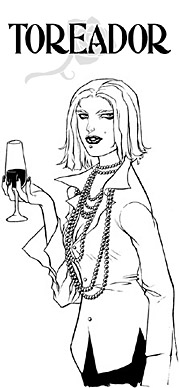 To the Toreador, eternal life is to be savored. Many Toreador were artists,
musicians or poets in life; many more have spent frustrating centuries producing
laughable attempts at art, music or poetry. Toreador tout themselves as cultivators of all that is best
about humanity. Occasionally, a particularly gifted
or inspired creator is Embraced into the clan, to
preserve her talent for eternity. In this manner,
Clan Toreador has inducted some of humanity's
greatest artists, poets and musicians into its ranks;
of course, if one thing can be said about the
Toreador, it is that no two of them agree on
precisely what "gifted" or "inspired" means.
To the Toreador, eternal life is to be savored. Many Toreador were artists,
musicians or poets in life; many more have spent frustrating centuries producing
laughable attempts at art, music or poetry. Toreador tout themselves as cultivators of all that is best
about humanity. Occasionally, a particularly gifted
or inspired creator is Embraced into the clan, to
preserve her talent for eternity. In this manner,
Clan Toreador has inducted some of humanity's
greatest artists, poets and musicians into its ranks;
of course, if one thing can be said about the
Toreador, it is that no two of them agree on
precisely what "gifted" or "inspired" means.
Of all clans, Toreador are the vampires most connected to the mortal world. While other vampires view the kine as pawns or simple sustenance, Toreador glide gracefully and effortlessly through the society of the Canaille, sampling the delights of each age as a gourmand savors rare delicacies. Toreador are the Kindred most likely to fall in love with mortals, and they surround themselves with the best, most elegant and most luxurious things - and people - that the world has to offer. It is, thus, acutely tragic when a Toreador succumbs to ennui and discards aesthetic pursuits in favor of pointless hedonism. Such Kindred become decadent sybarites, concerned only with indulging personal whims and vices.
 Toreador are committed to the Camarilla and share the Ventrue's
love of high society, though not for them the tedium of actually running
things - that's what functionaries are for, after all. Toreador know that
their place is to captivate and inspire - through their witty speech, graceful
deeds and simple, scintillating existence.
Toreador are committed to the Camarilla and share the Ventrue's
love of high society, though not for them the tedium of actually running
things - that's what functionaries are for, after all. Toreador know that
their place is to captivate and inspire - through their witty speech, graceful
deeds and simple, scintillating existence.
Nickname: Degenerates
Sect: Most Toreador are in the Camarilla, as only that august organization promotes "culture" and allows the Toreador to live among the mortals they so favor. Those in the Sabbat pursue bizarre "artistic" pastimes, such as torture and blood-painting, or are the rulers of the most decadent underground movements.
Appearance: Toreador Embrace out of passion as much as any other reason; accordingly, many Toreador are creatures of surpassing beauty. Of all Kindred, Toreador are the vampires most attuned to human fashion trends; centuries-old Degenerates are often more stylish than some 30-year-old mortals. If it's in, chances are that at least one Toreador will adopt it.
Haven: Toreador take care to ensure that their havens are comfortable, convenient for socializing and - above all - conform to their aesthetic tastes. Vampires of a more artistic bent might maintain spacious lofts to display their works, while their "poseur" counterparts love opulent suites perfect for hosting parties.
Background: Toreador range across a spectrum of concepts, from lonely, tortured artists to debauched jetsetters. Some Toreador are Embraced for no reason other than their beauty or personal style, as a passionate sire decides that they simply must be "preserved" for eternity.
Character Creation: Social Attributes and Abilities are prized among the clan, though Toreador are typically concerned less with outright control than with making a good impression. Perception is also favored, both for creation and for critiquing. Artistes favor Abilities such as Expression and Performance, often enjoying very high levels in these aesthetic Traits; their poseur brethren must make do with Abilities like Subterfuge and Etiquette. Toreador are very social creatures, and love adoration from both Kindred and kine; as such, Backgrounds like Allies, Contacts, Fame, Herd, Resources and Status are common.
Clan Disciplines: Auspex, Celerity, Presence.
Weaknesses: Toreador are preternaturally attuned to the aesthetic and beautiful, but this sensitivity can prove dangerous, When a Toreador views, hears or even smells something that is truly beautiful - a person, a painting, a song, a particularly lovely sunrise - he must make a Self-Control roll (difficulty 6) or become entranced by the sensation. The Toreador will stand in rapt fascination for a scene or until the beautiful thing withdraws. Enraptured Toreador may not even defend themselves if attacked, though being wounded allows them to make another Self-Control roll to "break the spell."
Organization: Toreador have little practical organization, though their cliquishness and social networks are legendary. The clan meets frequently, but more as an excuse to host lavish parties and showings than to accomplish anything. Status among the Toreador is a tempestuous whirlwind in which one subtle smile or catty critique can lead to fortune or disaster; a prodigy may be adored one night, commit a barely perceptible faux pas, and be ostracized the next.
Bloodlines: Toreador put a fair degree of stock in lineage; a vampire fortunate enough to descend from a favored sire is lavished with adoration (to her face, anyway), while childer of a sire "on the outs" suffer social humiliation. Few of these lines deviate from the main clan in any significant way. The Toreador antitribu of the Sabbat are a notable exception, for they take equal aesthetic delight in great beauty or great ugliness.
Quote: Oh, yes, isn't she exquisite? Yes, she's my newest find - I'm her muse, the sweet little creature. Imagine'. And what of - oh, Thomas? Why, I could hardly say - after all, he had his "15 minutes," as they say, but it just wasn't going to last, and it all became so very tedious, sol had to say adieu. Suicide? Really? Silly boy - he should thank me, then, that I didn't give him the Embrace. It would have made things so difficult, after all...
Stereotypes
Assamite: There is beauty in what they do, make no mistake, but it is a beauty best observed from a distance.
Brujah: On the first night, their passion terrifies. On the second night, their passion fascinates. On the third night, their passion inflames. After that... frankly, their passion begins to bore.
Followers of Set: It is inevitable, of course, that persons of epicurean refinement will in the course of eternity engage in dealings with those of... unsavory character. Record well any transactions made, and repay all favors promptly.
Gangrel: As charmingly untamed as a tiger; as worthy of consideration as a housecat.
Giovanni: They dress splendidly and are charmingly manneder. Why, then, do they frighten me so?
Lasombra: Their Miltonian conceit is dreadfully provocative, or provacatively dreadful but they take it all so seriously.
Malkavian: The frectured kaleidoscope of their thoughts is enchanting at fist glimpse. Gaze at it too long, though, and one grows prone to terrible headaches.
Nosferatu: Odious beats! And to think that they are allowed in the halls of culture! Oh, how gauche...
Ravnos: The subjects of many delightful stories - well, dreadful so long as one does not also feature in the tale.
Tremere: One deals with the butcher and the bureaucrat because they provide useful conveniences. One graciously acknowledges services efficiently performed. One does not, though, invite the hired help to the soiree, nor take kindly to party-crashers.
Tzimisce: To experience this clan's alien fruits would be almost worth the price. Remember well that "almost," dear.
Ventrue: Every masterwork must have its frame; every bust must have its pillar. This the Ventrue understand, and they perform their functions admirably.
Caitiff: Really. Who let them in?
Camarilla: Through its auspices may Kindred and kine harmoniously coexist, each benefiting from the other's presence.
Sabbat: Why would I wish to spend eternity wallowing in gore?
Tremere
Whether dreaded, nistrusted, feared or reviled, the insular vampires of Clan Tremere are anything but ignored. Those who have heard of the clan's doings are typically suspicious of the Tremere, and with good reason - for the Warlocks are aptly named. Through their own artifice, they have mastered a form of vampiric sorcery, complete with rituals and spells, that is as potent - if not more so - than any other power of the Blood. Paired with the clan's rigid hierarchy and the smoldering ambition so common among Warlocks, this power is an unsettling thing indeed to those who know what the Tremere are capable of doing.
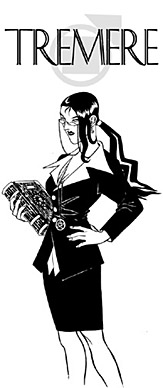 According to some Kindred records, the Tremere came into being as a clan
very recently, at least by an immortal's standards. Legend has it that,
during Europe's Dark Ages, a cabal of human wizards enacted a great ritual
over the slumbering body of an Antediluvian and thereby wrested for
themselves the gift of vampirism. War followed soon thereafter - the
fledgling clan found itself besieged by enraged Kindred on every side.
But the Tremere are nothing if not survivors. Their human
magicks lost, they nonetheless managed to alter their
rituals and wardings to utilize the power of their vitae.
These magical skills, now practiced as the Discipline of Thaumaturgy,
have ensured the Tremere's place among the Kindred ever since.
According to some Kindred records, the Tremere came into being as a clan
very recently, at least by an immortal's standards. Legend has it that,
during Europe's Dark Ages, a cabal of human wizards enacted a great ritual
over the slumbering body of an Antediluvian and thereby wrested for
themselves the gift of vampirism. War followed soon thereafter - the
fledgling clan found itself besieged by enraged Kindred on every side.
But the Tremere are nothing if not survivors. Their human
magicks lost, they nonetheless managed to alter their
rituals and wardings to utilize the power of their vitae.
These magical skills, now practiced as the Discipline of Thaumaturgy,
have ensured the Tremere's place among the Kindred ever since.
The Warlocks gladly play the games of diplomacy and intrigue with their newfound brethren. However, their dealings are always tinged with a touch of paranoia, for the Tremere know that the elders of no fewer than three clans bear them a terrible grudge that has yet to be repaid. Therefore, the Tremere work to cultivate what allies they can, even as they strive to heighten their magical mastery. No less is required for their survival. As a result, the childer of Clan Tremere are among the most driven and learned of all Cainites; few cross these undead sorcerers and escape unscarred.
 The Tremere are vampires of the Old World, but have traveled across the continents
to establish footholds elsewhere. The clan's seat of power lies in Vienna, where the
Tremere elders convene in council and discuss the clan's future direction. But many larger
cities across the globe house Tremere "chantries" - well-defended houses that are equal
parts university, monastery and stronghold. There the Warlocks gather to exchange
information and study their vampiric witchcraft, safe from the attentions of their rivals.
The Tremere are vampires of the Old World, but have traveled across the continents
to establish footholds elsewhere. The clan's seat of power lies in Vienna, where the
Tremere elders convene in council and discuss the clan's future direction. But many larger
cities across the globe house Tremere "chantries" - well-defended houses that are equal
parts university, monastery and stronghold. There the Warlocks gather to exchange
information and study their vampiric witchcraft, safe from the attentions of their rivals.
Nickname: Warlocks
Sect: The Tremere were more than glad to join the fledgling Camarilla when the sect was forming, and they quickly made themselves invaluable there. In fact, the Tremere are one of the linchpins of the sect. They have a marked interest in keeping the Camarilla strong, of course - I with their hated Tzimisce enemies directing their Sabbat minions against any Tremere they find, the Warlocks require allies. And with the valuable magical power they offer, the Tremere find the Camarilla glad to provide the support they require. With the Camarilla's protection, the Tremere are free to pursue the arcane mastery they so avidly desire.
Appearance: The sorcerous Tremere are typically imposing or sinister in mien. Some favor classic suits; others prefer a slightly more antiquated look, dressing in 1940s-cut suits, Edwardian finery or the simple black turtlenecks of the Beat era. Many wear charms or amulets inscribed with cabalistic or other arcane symbols, as a sign of their learning. Although individual Warlocks may run the gamut from immaculately precise to disheveled and eccentric, the vampiric sorcerers' eyes always gleam with hidden insight and frightening acuity.
Haven: While Warlocks may maintain their own individual havens (often complete with extensive libraries), the clan maintains a chantry in every city that harbors a strong Tremere presence. A chantry is open to any of Tremere's bloodline and absolutely forbidden to all others. The Warlocks are infamous for their well-guarded havens; almost all boast mystical wards that even other Tremere would find difficult to circumvent.
Background: Many Tremere dabbled in occult or other scholarly pursuits in life. However, a fascination with the unknown is hardly enough to draw a Warlock's attention; clan members seek "apprentices" with aggressive natures and clear thinking, and care little for muddle-headed New Agers or befuddled conspiracy theorists. Clan Tremere has an unspoken tradition of sexism, and most of its elders are male. Tremere ancillae have become rather more open-minded of late, though, and draw ample numbers of suitably ambitious and persistent acolytes from both sexes.
Character Creation: Tremere typically have strong Mental Attributes and a high Willpower to match; dilettantes and churls cannot meet the grueling demands of sorcery. Many have Knowledges as their primary Abilities, although Skills are also highly in demand. Although a few Tremere specialize in one particular area of excellence, many more prefer; a more well-rounded approach to personal aptitudes; after all, a Warlock can typically rely on no one other than himself.
Clan Disciplines: Auspex, Dominate, Thaumaturgy.
Weaknesses: By clan law, all neonate Tremere must drink the blood of the clan's seven elders when they are created. All Tremere are at least one step toward being blood bound! to their elders, and therefore usually act with great clan loyalty - in order to avoid having such loyalty forced on them. What's more, this arrangement means that Tremere are hard-pressed to resist the will of their elders; the difficulty of any Dominate attempt from a clan superior is one less.
Organization: No tighter internal structure exists among the clans. No clan binds its neonates so strictly. And no clan acts with such unity of purpose as the Tremere. Although younger clan members generally are free to do more or less as they wish, occasionally they receive instructions from their elders that they may not ignore. Paranoia keeps the clan well-oiled; and unified. Of course, the Tremere do encourage individual achievement among the group, seeing it as a Darwinian method of ensuring the clan's strength. With such ambitious, powerful young vampires cooperating with such commendable clan unity, it's no wonder the Warlocks have plenty of envious and spiteful enemies among the Kindred. The Tremere's pyramidal hierarchy contains several ranks, each divided into seven mystical "circles" that an aspirant must master if he desires to advance in rank (and nearly every Tremere desires that very thing). The lowest rank, that of apprentice, belongs to neonates. Above the apprentices are the regents, each one the master of a chantry; then the lords, whose domains include several chantries each. Forty-nine Tremere hold the title of pontifex, each bearing great responsibilities. And at the top of the pyramid sits the Inner Council of Seven, some the masters of entire continents, and all whispered to be in constant mental communication with the others.
Bloodlines: The strict organization of the Tremere, as well as their insistence on obeying one's elders, offers few freedoms. No variants of the Tremere bloodline have been allowed to survive to the present night. A small group of Tremere rebels once made its home in the Sabbat, but recent events have seen to that group's destruction.
Quote: We are more than vampires. We are the next step in Cainite evolution. We will direct the others if they allow us to do so, or we will stand alone if we must. But we will survive.
Stereotypes
Assamite: What is there to say? If they have thwarted our sorceries, then we have no choice but to erase them from the face of the planet as quickly as we can - or convince others to do it for us.
Brujah: Time has been cruel. When first we met, the Brujah were the scholars of our kind. Now they have crumbled to a sorry state, and we have taken up the flame of knowledge in their stead. It is only fitting, but it somehow seems wasteful. No matter.
Followers of Set: Damn them! Always prying with their slitted eyes and forked tongues, and always slipping back into the darkest corners, smiling the whole timr! What do they know?
Gangrel: These beasts feign loyalty, but are all too willing to hand us over to the Tzimisce if an excuse presents itself. We must be certain always to remain stronger than these hyenas who blame us for their old, poorly healed wounds.
Giovanni: They have made some rather impressive inroads into the arts, in a narrow-minded, limited sort of way. Still, it would seem that necrophilia as unhealthy for the undead mind as it is for the living.
Lasombra: For all their pretense of sophistication, their willingness to lie down with the Tzimisce clearly reveals their true savagery.
Malkavian: Their prattle of "insights" unknown to us grows tiresome very quickly. But however poor dinner guests they may be, they are seers of exceptional clarity. There's a trick to such perceptual shortcuts, and we can yet descover it.
Nosferatu: Some tasks are too noisome even for us, and the Nosferatu make appropriate lackeys to these ends.
Ravnos: They may be themselves magicians after a fashion, but give me 10 minutes with one of these charlatans and we shall see whose art has the true power.
Toreador: They are Aesop's grasshopper; we are the ant. They thinl to justify their immortality with their art and their parties, cold times are coming sooner than they think.
Tzimisce: One of the first lessons we all learn is that these Old World monsters still want nothing more than to rend our flesh from our bones. If that is the tune they prefer, we shall see how they dance when their rotting mansions are burning down around them.
Ventrue: These creatures obsess over control but have no sensibility for the finer points of power.
Caitiff: The other clans scorn our lineage, yet look how many of these bastard childe? they create.
Camarilla: There is strength in a tower, no matter how decrepit some of the bricks be.
Sabbat: They fancy themselves free? Fools.
Ventrue
The Kindred of Clan Ventrue have a reputation for being honorable, genteel and of
impeccabke taste. From time out of mind, Ventrue has been the clan of leadership, enforcing
the ancient traditions and seeking to shape the destiny of the Kindred. In nights of old,
Ventrue were chosen from nobles, merchant princes or other wielders of power. In modern
times the clan recruits from wealthy "old money" families, ruthless corporate climbers,
and politicians. Whatever their origin, Ventrue vampires preserve stability and
maintain order for the Camarilla. Other Kindred often mistake this for arrogance
or avarice, but to the Ventrue, their shepherd's role is more burden than honor.
Ventrue support the Masquerade wholeheartedly, feeling that under its
auspices the best existence for all vampires may be obtained. To the Ventrue
mind, other clans are brash and impetuous. Too concerned with their short-term comfort, other vampires gladly give up an eternity tomorrow for a bit of
vitae tonight. Without the Ventrue, there would be no Masquerade;
without the Masquerade, there would be no vampires. Thus, the Ventrue
have the weight of Atlas upon their shoulders. They bear their burden
with a stiff upper lip and just a hint of noblesse oblige. No other clan could
lead the Children of Caine in the nights of imminent Gehenna - or so
the Ventrue are apt to say. After all, their reputation rests on it.
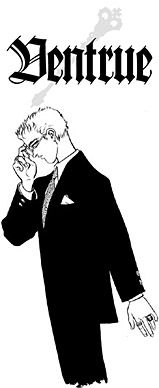
Ventrue see themselves as nobles in the classical sense of the word, fighting to uphold the station of those below them. They are the kings, knights and barons of the modem night. Although the struggle has moved from battlefields to boardrooms and from jousting lists to voting districts, Clan Ventrue continues the duel. Young Ventrue rally and lead the troops with their cellular phones and limousines, while the clan elders watch the horizons for threats that loom like storm clouds. Many holdings under Camarilla control are overseen by Ventrue, and the Blue Bloods are loath to relax their grip over endeavors they so desperately struggle to maintain. Reputation and achievement take a Kindred far in the Ventrue clan, but none of that counts if the vampire cannot maintain his influence.
Other vampires often cast aspersions on the Ventme, vilifying them as sanctimonious, pompous or even tyrannical - and yet it is the Blue Bloods to whom those other vampires turn when something goes wrong. Ventrue cultivate, influence and - when they can - control the kine's media, police, politics, health and medicine, organized crime, industry, finance, transportation and even the Church. When another vampire requires aid, the Ventme can, often provide it - for a price.
 Naturally, Ventrue gravitate to the upper crust
of kine society, where their sophistication serves them
in good stead. Although Ventrue move in the same
social circles as the Toreador, they do not fritter away their existences in frivolity and
idle chatter. The Ventrue proudly wear the privileges of leadership, and stoically bear
its burdens. Thus has it always been; thus shall it always be.
Naturally, Ventrue gravitate to the upper crust
of kine society, where their sophistication serves them
in good stead. Although Ventrue move in the same
social circles as the Toreador, they do not fritter away their existences in frivolity and
idle chatter. The Ventrue proudly wear the privileges of leadership, and stoically bear
its burdens. Thus has it always been; thus shall it always be.
Nickname: Blue Bloods
Sect: Elegant, aristocratic and regal, the Ventrue are the lords of the Camarilla. It was Clan Ventrue that provided the cornerstone of the Camarilla, and it is Clan Ventrue that directs and coaxes the Camarilla in its darkest hours. Even in the modem age, the majority of princes descend from Clan Ventrue. The Ventrue would, of course, have things no other way.
Appearance: Ventrue cultivate classical, traditional appearances. Set in their ways, Ventme vampires often affect the styles of their breathing days, and one may frequently guess a Ventrue's age by determining from which period of history her clothing dates. Young members of the clan tend toward fashions ranging from "preppy" styles to omnipresent suit-and-tie wardrobes. Ventme are elegant and stylish, but rarely on the cutting edge of couture or haberdashery trends. After all, one must stand out, not stick out.
Haven: Only the best will do. Ventrue commonly make their havens in mansions or valuable estates. Ventrue vampires often come from wealthy families, and their havens may even be ancestral homes. An old Ventme tradition holds that any member of the clan may take sanctuary with any other member of the clan, and cannot be refused. This tradition is rarely invoked, for the vampire seeking refuge subsequently owes a great debt to the vampire who provided succor. Nonetheless, the custom has saved the unlife of more than one Blue Blood.
Background: Ventrue traditionally hail from professional or high-society stock, though in modern nights the clan may claim any noteworthy person. Age, wisdom and experience play great parts in Ventrue Embraces, and a Blue Blood never Embraces capriciously. Some Ventme create neonates exclusivelt along family lines, in a twisted progression of gentrification. Other Kindred joke that the Ventrue are inbred, while the Ventrue themselves maintain that only the cream of the crop is suitable for membership in their clan.
Character Creation: Social and Mental Attributes are equally important, and illustrious members of the clan cultivate both aspects. Skills and Knowledges share similar importance, as the clan places great emphasis on being well-rounded and capable. Ventrue Kindred greatly prize Backgrounds, and high levels of Fame, Influence, Mentor, Resources, Retainers and Status go far toward establishing a Blue Blood's precedence.
Clan Disciplines: Dominate, Fortitude, Presence.
Weaknesses: Ventrue taste is rarefied to the point of exclusivity, and each Blue Blood may partake of only a certain type of mortal blood. This type is chosen at character creation. For example, a particular Ventrue might feed exclusively from virgins, blond men, naked children or clergy. The character will feed on no other type of blood, even if starving or under duress. Ventrue may feed on vampire blood normally.
Organization: The Ventme in a given region meet often, though their convocations resemble salons or debates and tend to result in more talk than action. Of course, this ponderous discourse is the only "civilized" way to resolve an issue, and impulsive or rash Kindred often chafe under the clan's rigidity. Younger, impatient Ventrue have been known to mount direct challenges to an "old boy's" holdings and position, which is considered the height of treachery and rudeness - unless, of course, the upstart wins.
Bloodlines: Heritage is prized among the clan, and the childer and grandchilder of luminaries are held in esteem (or envy) by the rest of the clan. On a darker note, the Ventrue antitribu of the Sabbat have no foes so hated as the Kindred of their parent clan. Sabbat Ventrue are dark knights of that sect sworn to atone for their line's failings by upholding the tenets of the Sabbat. They are most commonly found among the Sabbat's templars and paladins.
Quote: The guidance of the Damned is my burden to bear, not yours. You would do well, however, to ask yourself whether your unlife is one of benefit to the Children of Caine, or a detriment. I have already made my judgment.
Stereotypes
Assamite: Nobility once belonged to this clan, but they have cast aside their honor in pursuit of wanton diablerie.
Brujah: Old wounds scar the Rabble. These hotheads cultivate buried hatreds better than the harpies do. Still, we must be tolerant - centuries of failure must surely be difficult to bear.
Followers of Set: Their association with serpents is more than appropriate, for their poison infects all whom they taint with their presence. Do not allow them in your domain.
Gangrel: They are as trustworthy and useful as well-bred dogs. We send them forh when it is time for hunting, then call them back to the kennel when more subtle tasks beckon. In this way does everyone fulfill their role.
Giovanni: There are none so base as those who would raze the pillar of stability to further their own twisted interests.
Lasombra: For time out of mind have we dueled with these self-styled Keepers. It is a small comfort to see they cannot achieve for their Sabbat what we have garnered for the Camarilla. All the capering and blood-sports in the world cannot disguise inadequacy.
Malkavian: The price they pay for their supposed enlightenment far exceeds its benefice. Still, learn from them what you may.
Nosferatu: These pitiful creatures still pay the debt earned by their sires so many nights ago, though through no fault of their own.
Ravnos: Exercise the wisdom of the ancient kings when dealing with these vulgar deceivers.
Toreador: Truly, their great passion must be a curse, for Kindred lack the ability to create what they may only impotently observe.
Tremere: It is good that they favor stability, otherwise their depredations might outweigh their utility.
Tzimisce: Are there any left? How quaint!
Caitiff: One can choose neither one's parents nor one's sire, so bear them no ill will unless they earn it.
Camarilla: This is both our honor and our penance.
Sabbat: Infantile and unruly, the Sabbat abandons any hope of redemption.
The Sabbat
 The Camarilla's archenemy is the monstrous sect known as the
Sabbat. Perceived as mindless savages and bloodthirsty fiends by the
Camarilla and independent clans alike, the Sabbat is vilified among
the society of the Damned, and for good reason. They're just not the
reasons other Kindred claim. While the "Kindred" of the Camarilla
espouse concealing themselves among mortals and maintaining the
tattered vestiges of their Humanity, the Sabbat favors a different
philosophy. Not content to cower like beaten dogs from humans, nor
to act as pawns in the schemes of their elders, Sabbat vampires
instead prefer to revel in their undead nature.
The Camarilla's archenemy is the monstrous sect known as the
Sabbat. Perceived as mindless savages and bloodthirsty fiends by the
Camarilla and independent clans alike, the Sabbat is vilified among
the society of the Damned, and for good reason. They're just not the
reasons other Kindred claim. While the "Kindred" of the Camarilla
espouse concealing themselves among mortals and maintaining the
tattered vestiges of their Humanity, the Sabbat favors a different
philosophy. Not content to cower like beaten dogs from humans, nor
to act as pawns in the schemes of their elders, Sabbat vampires
instead prefer to revel in their undead nature.
As the Sabbat reasons, vampires are a cut above mortals, who are merely food or diversion. Isn't Kindred vitae more powerful than mortal blood? Don't vampires have unnatural powers with which to assert themselves over the bovine masses? Who needs petty mortal morality when one is a blood-drinking, immortal monster? The Sabbat, though, involves far more than a simple carte blanche to behave as abominably as one chooses. Sabbat vampires are inherently alien, and their behavior reflects this.
Sabbat vampires wish no place among humans or those who pretend to be humans. They loathe humankind except as sustenance, and they lack the ability to relate to vampires who cannot accept their natures. They even rebel against their own solitary unlives, traveling in wild nomadic packs instead of eking out secretive, isolated existences. For this reason, tensions run high in the Sabbat, and the sect's surroundings often suffer for it. Cities held by the sect are some of the most violent places in existence, challenged for this dubious honor only where Sabbat and Camarilla vie for supremacy. Mexico City, Detroit, Miami and Montreal are all under the purview of the Sabbat. Cities in contention include New York; Washington, DC; Buffalo; and Atlanta. A city under Sabbat control or conquest is an explosive, volatile place; murders occur nightly, and rape and robbery are to be expected at every turn. In the World of Darkness, these cities have themselves grown toward the alien and away from the human, abandoned as they are to the depredations of the monsters who prowl their alleyways.
Thus, the Sabbat threatens every city it touches, creeping like a cancer into communities that remain oblivious until the war packs tear the city down around them. Though it is arguably no more "evil" than the degenerate elders of the Camarilla, the Sabbat is almost universally more blatant, terrorizing the kine populace with insidious games and premeditated destruction.
Now more than ever before, the Sabbat has the Camarilla on the ropes. Many Camarilla neonates, frustrated by the unattainable power and stagnant ineffectiveness of their elders, have joined the Sabbat in open protest. Numerous cities that were once bastions of Camarilla strength now exist in stalemate or contention. Camarilla princes fear the swelling tide of the Sabbat, and with good cause: Their unlives and those of the Kindred in their cities are on the line. Accordingly, Sabbat members in a Camarilla city can expect no quarter if exposed, as princes and primogen ruthlessly quash agents of the infernal insurrectionist sect. Many neonates, still wishing to please their sires and build a place for themselves in the Camarilla, aid their elders in Sabbat persecution. It would seem they prefer the evil they know to the one they've heard so many horror stories about.
Practices and Organization
Sabbat culture revolves heavily around the twin principles of loyalty and freedom. Vampires, as superior beings, are free to do as they please, but they must also remain tme to the Sabbat, lest their freedom be jeopardized by the machinations of the elders. Above all, the Sabbat refuses to be placed under the yoke of the Antediluvians; many of the sect's schemes involve means of frustrating, or at least surviving, Gehenna. The sect's two founding clans,, the Lasombra and Tzimisce, are said to have diablerized and destroyed their progenitors, and the other Sabbat vampires follow their lead, hoping that they may one night do the same.
Internal rivalries, power plays and ancient vendettas rend the sect from within, however, and the Sabbat often takes two steps back for every three it takes forward. The sect has no true, all-encompassing guidance; it is a hydra, doubling back to bite itself and its foes even as it gains in membership and influence.
Sabbat vampires themselves, with the exception of the Lasombra and Tzimisce shepherds of the sect, mockingly claim to be "anti-clans," or antitribu, of their parent clans. Some Sabbat vampires openly involve themselves in Satanism, paganism or other deviant faiths to spite the propriety of those who stand against them. Perversion and brutality are the Sabbat's tools, and the sect uses them with merciless cunning.
The nucleus of the Sabbat's organization is the "pack," a loose confederation of vampires nominally united toward a single goal. Sabbat packs may be nomadic, traveling from city to city leaving death and fire in their wakes, or they may settle in one location on a permanent basis. Because vampires are primarily solitary predators, forcing themselves into each other's company for prolonged periods of time certainly takes its toll on the individual Kindred who make up the packs.
Rituals
Sabbat vampires, upon their Embrace, are unceremoniously buried in the ground. The subsequent rite of having to claw her way out of the cold, blind earth after having her head dashed open with a shovel strips away much of a Sabbat neonate's Humanity. She is then ready to join her Sabbat sectmates as a monster rather than as a feeble, mewling kine.
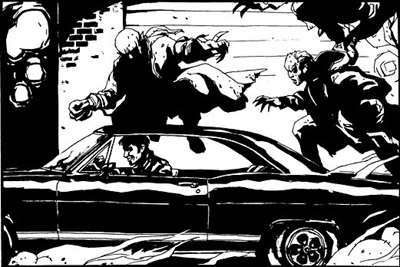 The Sabbat corrupts and distorts many conventions of the
institutions that stand against it. Many of the rituals and
practices of the sect stem from the Catholic Church, including
partaking of the VauLderie, a corruption of the Eucharist in which
vampires drink from a chalice of their commingled vitae to
strengthen loyalty.
The Sabbat corrupts and distorts many conventions of the
institutions that stand against it. Many of the rituals and
practices of the sect stem from the Catholic Church, including
partaking of the VauLderie, a corruption of the Eucharist in which
vampires drink from a chalice of their commingled vitae to
strengthen loyalty.
The vampires of the Sabbat also participate in numerous other rituals, of which there are a seemingly endless number. The sect regularly makes use of fire, serpents, violence and blood at its rituals, which may take the form of fire dances, snake-handling, torture, ceremonial killing or other debased practices. The rituals' purpose is to create solidarity in the packmates, who lead tense, hostile unlives and are prone to fractiousness and mistrust.
Offices
The Sabbat, for all its disorganization, maintains numerous positions for its members. Each pack usually has a priest, who leads the pack in its rituals and sometimes its other affairs. The offices of archbishop (the vampire who oversees Sabbat activity in a given city) and bishop (a vampire who assists the archbishop and carries out her will) command great respect among vampires in a city where these Kindred are encountered. Above these offices are those of the cardinal, who coordinates Sabbat influence over a given region; and the prisci (singular priscus), who act as advisors to the "supreme" leader of the sect, the regent. The martial arm of the governing body comprises the templars and paladins, who serve as assassins and bodyguards for the regent, prisci and cardinals Worrisome references are made to a "sect within the sect" known as the Black Hand, but these are often simply confused references to the sect itself, which has used that moniker before.
The View from Without
The Camarilla
I heard that the Sabbat drink each other's blood and bum their sires to cinders at their coven meetings. I've been to Sabbat cities before, and they're the most rundown, violent hellholes in the First World. Did you know they handle snakes, practice black magic and bury each other alive! As if being a vampire isn't curse enough - these guys have to raise the Devil on top of it!
The Independents
They're insidious, those Sabbat. At least with the Camarilla, you know they're going to stab you in the back. Those maniacs in the Sabbat sell you insurance while they're setting your haven on fire and hanging your sister upside down in the basement. Don't give on inch, though, because if they respect you, they're more likely to burn down someone else's house.
Lasombra
The Lasombra clan has fallen from grace - and its members enjoy it. Simultaneously graceful and predatory, the Lasombra guide - and, when necessary, whip - the Sabbat into an implacable force. Turning their backs upon the humans they once were, Lasombra give themselves wholly over to the dark majesty of the Embrace. Murder, frenzy, predation: Why fear these things, many Lasombra ask, if one is meant to be a vampire ? In contrast to the Tzimisce, though, Lasombra generally seek not to reject all things mortal, but to shape, them for their own pleasure.
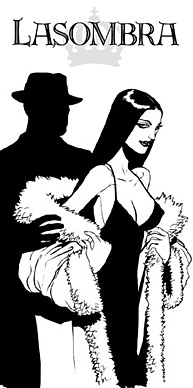 The Lasombra have been involved with the Church since
its inception, and some Kindred whisper that the clan was
instrumental in the spread of the Christian faith. In modern
nights, however, Lasombra have turned their backs on that
divine institution. There are exceptions, of course, but for the
most part, Clan Lasombra bears only contempt for the notion of
salvation. In fact, the Lasombra brought many of the Church's
rites and rituals into the Sabbat sect, twisting them into
mockeries of Christian doctrine. The Lasombra ordained many of the sect's auctoritas and ignoblis
ritae, so that the vampires of the Sabbat might
never forget who and what they are.
Lasombra are best known for their Discipline of Obtenebration, a means by which
they call forth a tangible "living" darkness,
manipulating it at their whim. Clan doctrine
holds that this "darkness" is in fact the stuff of
the vampiric soul, which has been simultaneously strengthened and corrupted by the
Embrace. Through the Curse ofCaine, some
Lasombra believe, God has cast them out,
and thus it is their duty to build a new order
on Earth via the Sabbat. More scientific
Lasombra scoff at this superstition, but even
they tend to believe that, as vampires, they
represent a new and more advanced breed of
sentience, one unconcerned with petty human
notions of ethics. Let the milksops of Clan
Ventrue burn in the solar fires of martyrdom; the
Lasombra are happy with what they are.
The Lasombra have been involved with the Church since
its inception, and some Kindred whisper that the clan was
instrumental in the spread of the Christian faith. In modern
nights, however, Lasombra have turned their backs on that
divine institution. There are exceptions, of course, but for the
most part, Clan Lasombra bears only contempt for the notion of
salvation. In fact, the Lasombra brought many of the Church's
rites and rituals into the Sabbat sect, twisting them into
mockeries of Christian doctrine. The Lasombra ordained many of the sect's auctoritas and ignoblis
ritae, so that the vampires of the Sabbat might
never forget who and what they are.
Lasombra are best known for their Discipline of Obtenebration, a means by which
they call forth a tangible "living" darkness,
manipulating it at their whim. Clan doctrine
holds that this "darkness" is in fact the stuff of
the vampiric soul, which has been simultaneously strengthened and corrupted by the
Embrace. Through the Curse ofCaine, some
Lasombra believe, God has cast them out,
and thus it is their duty to build a new order
on Earth via the Sabbat. More scientific
Lasombra scoff at this superstition, but even
they tend to believe that, as vampires, they
represent a new and more advanced breed of
sentience, one unconcerned with petty human
notions of ethics. Let the milksops of Clan
Ventrue burn in the solar fires of martyrdom; the
Lasombra are happy with what they are.
Naturally, this villainous outlook is not universal among the clan, but many newly Embraced Sabbat Lasombra take great glee in the wanton destruction and vulgar depravity that such a philosophy allows. In striking contrast, some elder Lasombra still maintain their ties to the Church, though even they seem to consider themselves "tools of the Devil." The two groups do see eye to eye on one matter: Members of Clan Lasombra, as consummate manipulators themselves, adamantly refuse to submit to the antiquated whims of the Antediluvians. They fight the Jyhad proudly, but unlike many Kindred, they firmly believe they can win.
 The typical Lasombra possesses a gift for manipulation, as
well as keen leadership skills. Lasombra are the most common
leaders of Sabbat packs, as their motivational and Machiavellian
natures make them ideal for orchestrating the movements of the
sect. Unfortunately, pride goes hand in hand with this dark
nobility, and very few Lasombra acknowledge other vampires as
equal, let alone superior.
The typical Lasombra possesses a gift for manipulation, as
well as keen leadership skills. Lasombra are the most common
leaders of Sabbat packs, as their motivational and Machiavellian
natures make them ideal for orchestrating the movements of the
sect. Unfortunately, pride goes hand in hand with this dark
nobility, and very few Lasombra acknowledge other vampires as
equal, let alone superior.
Nickname: Keepers (as in "my brother's...")
Sect: The Lasombra are the ruling clan of the Sabbat, as much as any clan can be said to "rule" that chaotic body. A few elder Lasombra hold membership in the Camarilla or Inconnu, but such creatures lead lonely and perilous existences.
Appearance: Many Lasombra of elder generations hail from Spanish or Italian stock, and some still show their Moorish or Berber heritage. Lasombra neonates and ancillae, however, run the gamut of cultures and ethnicities. Almost all Lasombra are reasonably attractive, with well-bred, aristocratic features - blue-collar Lasombra are rare, and one hardly sees the callused hands or broken noses of the working class among the Keepers.
Haven: Many young Lasombra disdain private havens, sleeping with the pack and maintaining communal lairs "for the good of the sect." Old habits die hard among the Keepers, though; certain elders maintain ancestral manses or other osten- tatious havens.
Background: Lasombra may come from any background, but are typically professionals, politically inclined or well educated. Lasombra tend to be aggressive., both physically and socially; the clan has little interest in weaklings and: does not, hesitate to cull unworthy vampires from its ranks. Lasombra are universally skilled at social discourse and pulling the strings of others - coarse manners are viewed poorly, for the Lasombra are refined monsters.
Character Creation: A Lasombra may have any Demeanor (the better to hide her true Nature!). Most Lasombra favor Social Attributes, though Mental Attributes are prized almost as greatly. Many Keepers cultivate extensive Influence, Status (Sabbat) or Resources, and favor Backgrounds more than additional Disciplines or Abilities. Lasombra founded the Path of Night, and this Path has a number of followers in the Keepers' clan (though many choose to follow other Paths of Enlightenment, and some Lasombra keep vestiges of Humanity).
Clan Disciplines: Dominate, Obtenebration, Potence
Weaknesses: Lasombra vampires cast no reflections. They cannot be seen in mirrors, bodies of water, reflective windows, polished metals, photographs and security cameras, etc. This curious anomaly even extends to the clothes they wear and objects they carry. Many Kindred believe that the Lasombra have been cursed in this manner for their vanity. Additionally, due to their penchant for darkness, Lasombra take an extra level of damage from sunlight.
Organization: Clan Lasombra's structure is simultaneously formal and open. Respect and homage are afforded to the elder warriors who helped found the Sabbat, but younger members operate with almost no guidance from the clan as an entity. Quarterly meetings, known as conventicles, serve to keep the Lasombra informed as to each other's status, and blood-drinking rituals are performed at these meetings. While no Lasombra is ever told "You may not do that" (at least not publicly), almost all Keepers have a profound respect for tradition. A secret Lasombra coterie known as Les Amies Noir is rumored to hand down "death sentences" on those Keepers who bring undue shame, attention or ignominy to the clan or its members.
Bloodlines: Lasombra antitribu are among the staunchest supporters of the Camarilla, though the sect largely distrusts them. Some of the eldest members of Clan Lasombra hold the Sabbat Lasombra in contempt. Naturally, the Sabbat Lasombra greatly fear these powerful Kindred who oppose them, and nothing rallies rival Lasombra like the rumor of an antitribu in their midst.
Quote: Shadows? Hah! I wield Darkness itself, not mere shadows! Tell me - could a shadow do this?
Stereotypes
Assamite: Useful tools, though a bit too... independent of late.
Brujah: Their fiery passion, once harvested, makes a wonderful means through which to use them toward your own ends.
Followers of Set: Hmm... How best to keep them in Egypt?
Gangrel: Easily excited; terrible, monstrous foes. Agitate them and turn them loose on your enemies.
Giovanni: The tree that does not branch hides rot within.
Malkavian: Madness sometimes offers insight, but usually simply obstructs those who would glean its benefit.
Nosferatu: Useful as flies on the wall when you need them, but Nosferatu tend to draw too many flies themselves. Ravnos: Rather than deal with them directly, it's best to goad them somewhere else and let whoever dwells there address the problem.
Toreador: They possess the most tortured of unlives, and devious minds often lurk under their flighty facades.
Tremere: Inelegant, yet effective in their own way. Their continued existence certainly keeps the Fiends' attentions constructively channeled.
Tzimisce: Valorous allies and venomous rivals, often simultaneously.
Ventrue: Their potential is dissipated by their weakness. They squander their curse by lurking among mortals.
Caitiff: I find it unimaginable that any of these survive past the initial disappointment of learning what they are.
Camarilla: Acceptable, if you're talking about a kine institution. If you're a blood-sucking devil of the night, though, why hide train those upon whom you prey?
Sabbat: If it would merely listen a little better, it would almost lie worth the effort we invest in it.
Tzimisce
If Clan Lasombra is the heart of the Sabbat, Clan Tzimisce is the soul. Even other vampires grow uneasy around these eerie Kindred, and the clan's nickname of "Fiends" was given to it in nights past the horrified Kindred of other lines. The Tzimisce's signature Discipline of Vicissitude is the subject of particular dread; tales speak of crippling disfigurements inflicted on a whim, of ghastly "experiments" and tortures refined beyond human - or vampiric - comprehension or endurance.
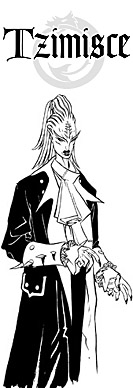 This fearsome reputation often seems unwarranted at first. Many Tzimisce are
reserved and perspicacious beings, a far cry from the howling war packs that compose
much of the Sabbat. Most Tzimisce appear to be rational creatures, formidably
intelligent, possessed of an inquisitive and scientific bent, and unstintingly
gracious to guests.
This fearsome reputation often seems unwarranted at first. Many Tzimisce are
reserved and perspicacious beings, a far cry from the howling war packs that compose
much of the Sabbat. Most Tzimisce appear to be rational creatures, formidably
intelligent, possessed of an inquisitive and scientific bent, and unstintingly
gracious to guests.
Kindred who treat with the Tzimisce, though, realize that the Fiends' human traits are the merest veneer over something... else. For millennia the Fiends have explored and refined their understanding of the vampiric condition, bending their bodies and thoughts into new and alien patterns. Should it prove necessary, enlightening or simply enjoyable, Tzimisce do not hesitate to bend victims in similar fashion. While younger Fiends might be described as merciless or sadistic, elders of the line simply fail to comprehend mercy or suffering - or perhaps they do comprehend, but no longer consider the emotions relevant.
In nights past, the Tzimisce was among the most powerful clans in the world, dominating much of the region now known as Eastern Europe. Potent sorcerers, the Fiends dominated the region's mortals as well, in the process inspiring many of the horror stories about vampires. Clan after clan conspired to uproot the Tzimisce, but it was the sorcerous Tremere who finally succeeded. Indeed, as some tell the tale, the Tremere used captured Tzimisce vitae in their experiments to become immortal. For this, the Tzimisce hate the Tremere unrelentingly, and Tremere who fall into the Sabbat's clutches typically suffer a hideous end at the talons of the Fiends.
During the Great Anarch Revolt, the Tzimisce clan turned on itself, as younger members of the clan discovered mystic means of breaking the blood bonds ensnaring them in the service of their elders. In the ensuing struggle, the younger Fiends destroyed many of their elders and demolished what was left of their power bases. Certain Sabbat whisper that the clan managed to find and destroy its own Antediluvian progenitor, though the Fiends will neither confirm nor deny this tale.
 Now the Tzimisce serve the Sabbat as scholars, advisors and priests. Many
of the sect's practices originated in the customs of the clan. By exploring the
possibilities and limits of vampirism, the clan hopes to discover the greater
purpose of the Kindred as a whole. If this means the wholesale destruction of the
archaic Antediluvians, the razing of the Camarilla, and the vivisection of
millions of kine victims, well, all experiments have their consequences.
Now the Tzimisce serve the Sabbat as scholars, advisors and priests. Many
of the sect's practices originated in the customs of the clan. By exploring the
possibilities and limits of vampirism, the clan hopes to discover the greater
purpose of the Kindred as a whole. If this means the wholesale destruction of the
archaic Antediluvians, the razing of the Camarilla, and the vivisection of
millions of kine victims, well, all experiments have their consequences.
Nickname: Fiends
Sect: Most Tzimisce serve the Sabbat. A few powerful Tzimisce elders retain their independence; these are believed to be Inconnu. Almost no Tzimisce are in the Camarilla; even those Fiends unsympathetic to the Sabbat find the Camarilla's skulking among the masses to be distasteful.
Appearance: As masters of the Vicissitude Discipline, Tzimisce often have striking appearances - whether strikingly beautiful or strikingly grotesque depends on the whim of the Fiend in question. Younger Tzimisce, seeking to explore their inhuman natures, perform all manner of body modifications on themselves. Their elders, though, often affect flawless, symmetrical forms; the body is merely a passing useful machine, after all. Tzimisce faces often resemble masks of blank perfection, and the Fiends typically laugh little, though some have been known to chuckle during particularly elaborate experiments.
Haven: Tzimisce are exceedingly private beings, placing great value on the sanctity of the haven. In fact, the elan has an entire series of elaborate protocols based around hospitality. Guests invited into a Fiend's haven are protected with the host's unlife; trespassers are pursued to the ends of the Earth and punished in gruesome and lingering fashion. Surprisingly, Tzimisce havens, or "manses," are not necessarily comfortable or well-kept in the manner of Ventrue or Toreador dwellings. The amenities of mortals matter little to the Fiends.
Background: Tzimisce rarely Embrace capriciously; choice of childer reflects on the sire, and thus Fiends choose only those mortals who they feel have the capacity to improve the clan as a whole. "Brilliance" and "insight" are particularly prized; whether a childe's brilliance and insight manifest in scientific theory or serial murder is a trifling:distinction.
Character Creation: Mental Attributes are most prized among the clan. Although descended from a background of nobility, the typical Sabbat Fiend is unconcerned with petty social interplay; thus, Social Attributes (with the notable exception of Appearance) are rarely primary. Knowledges are favored, and Tzimisce are as likely to follow a Path of Enlightenment (see p. 286) as they are to retain Humanity. Tzimisce often have Status (in the Sabbat), Resources and Retainers (ghouls).
Clan Disciplines: Animalism, Auspex, Vicissitude.
Weaknesses: Tzimisce are very territorial creatures, maintaining a particular haven and guarding it ferociously. Whenever a Tzimisce sleeps, she must surround herself with at least two handfuls of earth from a place important to her as a mortal - perhaps the earth of her birthplace or the graveyard where she underwent her creation rites. Failure to meet this requirement halves the Tzimisce's dice pools every 24 hours, until all her actions use only one die. This penalty remains until she rests for a full day amid her earth once more.
Organization: Despite the Tzimisce's pride in their heritage and customs, little organization exists among the clan. Sires and childer remain closer than most Sabbat vampires do, but in general each Fiend makes her own way in the world. One among the Fiends' number bears the ancestral title of Voivode; the Voivode is nominally the clan leader, though in practice he acts more as a "priest" or rite leader than a temporal ruler.
Bloodlines: Many Tzimisce are descended from specialized "ghoul families" who have long served the clan as minions. Tzimisce descended from the ghoul family Bratovitch replace Auspex with the Clan Discipline of Potence, but suffer +1 difficulty on any roll to avoid frenzy. Certain Tzimisce are koldun, or sorcerers. These Kindred replace the clan Discipline of Vicissitude with Thaumaturgy, but suffer +1 difficulties to resist magic as well.
Quote: Welcome; a thousand welcomes! I am honored that we could put aside the Jyhad's foolish rivalries for a night, that you might come under my eaves in the spirit of - eh? You start? Ahh - that noise! A trifle! Nothing that need concern you, sweet guest!
Stereotypes
Assamite: Once again the Turks howl outside the gates. The Final Nights must surely be nigh.
Brujah: Like ourselves, they have been unjustly toppled. Unlike ourselves, they have not adapted well at all.
Followers of Set: A worm, some say, can be cut in two, or even minced, yet each piece will wondrously grow whole once more. Can the Setites do likewise, I wonder?
Gangrel: Already the hunting hound paces its kennel. Soon it shall come and lick the feet of its old master.
Giovanni: Why do they obsess over states of being that, as immortals, we need not deign to trouble ourselves with?
Lasombra: They are shadows in truth - menacing but ultimately ephemeral. Still, ofttimes it is easier to accomplish tasks under cover of cloaking darkness.
Malkavian: The aphorism that genius and madness lie close at hand was assuredly coined by a Lunatic wretch who wished to concoct an excuse for his infirmity.
Nosferatu: No matter how one twists, they always return to their original state. Fascinating.
Ravnos: No one merits fiercer punishment than the uninvited guest.
Toreador: So lovely, so pliable, like dolls! Their most charming gift, though, is in the screaming.
Tremere: They wished for immortality; now they have it. Realize, upstarts, that agony properly administered can make an instant seem like an eternity, and that an eternity of eternities is a long time in which to suffer.
Ventrue: If one chooses, improperly, one can at least uphold one's error with dignity. The Ventrue embody much that is noble about the Damned, and so, when the time to destroy them comes, we will allow them to die the long way, with honor.
Caitiff: Most were created rashly; as such, few are of any use save as objects of study.
Camarilla: The cauldron in which the Ancients hope to cook a bloody stew. When it is tipped over, the others will see, and thank us.
Sabbat: Flawed, but our greatest - and only - hope nonetheless.
The Independents
 Since the close of the Middle Ages, the dangerous pavanne
danced by Camarilla and Sabbat has shaped the face of Kindred
society. The bloody conflict has broken millions of human lives
and shaped the secret history of cities across the world.
Since the close of the Middle Ages, the dangerous pavanne
danced by Camarilla and Sabbat has shaped the face of Kindred
society. The bloody conflict has broken millions of human lives
and shaped the secret history of cities across the world.
Of course, there are some clans that watch both sects leap at one another's throats in the name of the Jyhad - and prefer to have none of that, thank you very much. Although they certainly have the pedigree of true clans (as opposed to the mongrel bloodlines that occasionally surface), the four independent clans share a powerful disinclination to "take sides" in the Jyhad. Of course, some of the younger members of each clan can be found in both Camarilla and Sabbat. However, the elders of the independent clans plot toward their own inscrutable purposes, purposes that would be delayed by such nonsense as sect allegiance.
It would be foolish to assume that the average member of an unaligned clan is somehow possessed of an absolute allegiance to her clan's ideal. Like all other Kindred, the independents are, vampires first and clan members second. Most of these Cainites are concerned with their personal goals first and foremost, whether or not they coincide with (or serve) those of their clans. This fact serves only to aggravate outside observers further; an independent vampire is often a true wild card, with neither sect politics nor clan law as a guideline for predicting her behavior.
And yet...
And yet, rumor has it that the elders of the independent clans are awake in greater numbers than those of any other bloodline. One clan has thrown off an ancient spell that kept it in check, presumably due to the direct intervention of its forebears. Another, the youngest of the clans, allegedly has enjoyed the unceasing patronage of its founder since the Renaissance. The terrible and merciless Methuselahs of a third are said to be throwing off the earth of the ages and summoning their childer to them. And the fourth...
But despite such talk, the childer of each independent clan continue their activities as if all is well, offering as much loyalty to their clans as they did before. If they are indeed pawns of their Antediluvian sires, they are apparently ignorant of the fact - or worse, fully cognizant, and quite acquiescent.
The Unaligned Clans
The four independent clans have little in common, save their disdain for sects. Each pursues its own goals, and each defines its role in the Jyhad differently. Diffident even to each other, they keep their own laws amid the Camarilla's Traditions and the Sabbat's chaos.
- The Assamites are a predatory clan of vampires based in the Middle East. For ages, they have served as independent contractors. assassins for hire to any who provided them with blood. Now, with the ancient curse lifted again, they are proving themselves enemies of all clans as they seek to slake their botomless thirst for Canreite vitae.
Of all the independents, the Assamites are most feared by the others. Their role in the Jyhad, formerly that of mercenaries alone, has abruptly changed. None can say where the Assamites' loyalty will lie in the next decade or so - or how their new practices will alter the Jyhad itself.
- The Followers of Set disdain sects for different reasons. They claim to be heirs to a tradition far older than both Camarilla and Sabbat, and scorn the idea of setting aside their hereditary tasks for a passing fad of mere centuries or so. The tenets of the clan's shadowy faith allegedly date back to the first nights of civilization, and this ancient pedigree takes precedence cover matters of mere politics.
The "Setites," as they also call themselves, aren't above playing a fairly mercenary role between the two sects. The clan coffers hoarded knowledge and sinister favors to any vampire... for a price. Many elders of other clans look askance on the Setites' bartering; it seems all too possible that with every deal struck, the Clan of the Serpent takes another step to whatever goal its Antediluvian founder has set for it.
- The Giovanni are as much a family as they are a clan; the majority of their neonates are Embraced from clan members' mortal descendants. The insular Necromancers avidly pursue two goals: accumulating material wealth and power, and learning the secrets of Death itself.
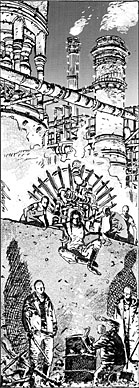 The Giovanni, frankly, see no need for sects. They effectively police their own ranks, and managed to survive the
Inquisition quietly, without requiring the help of other Kindred.
They have all the allies they need in the form of their family, and
can sternly enforce such aid when necessary. All they require is
to be left alone to achieve their own ends - and the prospect of
their success is frightening indeed.
The Giovanni, frankly, see no need for sects. They effectively police their own ranks, and managed to survive the
Inquisition quietly, without requiring the help of other Kindred.
They have all the allies they need in the form of their family, and
can sternly enforce such aid when necessary. All they require is
to be left alone to achieve their own ends - and the prospect of
their success is frightening indeed.
- Finally, the Ravnos are driven by a clanwide compulsion for larceny and deception, as well as a powerful wanderlust. These masters of illusion, primarily of Indian and Gypsy stock, owe allegiance to themselves first, their clan second, and to no one else at all. Certainly the most loosely organized of the unaligned clans, the nomadic Ravnos are scattered across the world. They travel freely between Camarilla and Sabbat territory, for most princes have learned that it is more trouble to attempt to keep a Ravnos from one's city than to wait for the wastrel vampire to become bored and move on.
The Ravnos are flatly indifferent to sect politics, and most vampires have dismissed them as incapable of playing any great role in the Jyhad. They seem too chaotic and undisciplined to br of any use even to Methuselahs - and the Ravnos enjoy that reputation. The clan has happily lasted the past millennium or so without responsibility or duty, and sees no reason to change However, the near future may see the Ravnos working toward a common purpose after all....
The Camarilla
As if we didn't have enough to worry about, these vipers insist on playing both sides against one another. It's certain they're up to no good; what else could convince them they could survive without aiiies? They are perfectly capable of shifting the balance of the Jyhad, and they know that full well. I would pray that they malic the proper choice - if I believed anyone would listen to me.
The Sabbat
They are too weak to threaten our power - but also too strong to crush easily beneath our boots. Sometimes we lose a pack, or more, to idiocy; only a fool tries to wrest a Serpent from its den, or beat one of those damn Giovanni at his own game. But we learn from such things. We learn where the so-called "free clans" are strong, and where they are not so strong. And they will be not so strong when the earth cracks open and the sun goes red. That I guarantee.
Assamite
From the desert wastes of the East come the Assamites, and they bring with them a miasma of terror. The Assamites are known throughout vampire society as a clan of murderous assassins, working for whoever can pay their price. The price they charge for their work is the vitae of other Kindred; for the Assamites, diablerie is the greatest sacrament. Assamites tend to avoid the affairs of the Camarilla and the Sabbat, working for either or both sides in pursuit of their goals. They do circulate among sect-held cities; other Kindred find them useful for slaying rivals, enforcing blood hunts, scourging undesirable childer, and infiltrating rivals' power bases. However, Assamites rarely form true alliances with other Kindred, for they consider other Children of Caine to be of inferior stock. Unlike the other clans, the Assamites do not claim to have a founder of the Third Generation. Rather, they believe their founder to be a member of the Second Generation, making all other Cainites flawed copies of themselves.
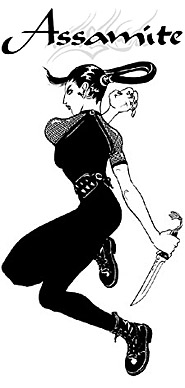 In nights prior to die formation of die Camarilla and the Sabbat, the Assamites practiced diablerie
widely, always looking to bring themselves closer to "the One," as they referred to their mythical founder.
As the Anarch Revolt ensued, and the Sabbat and Camarilla rose from the ashes, many powerful elders
grew uneasy at the cannibal assassins stalking their ranks. Calling upon the Tremere to curse the Assamites'
blood, the Camarilla placed a yoke on the clan that rendered its members unable to consume the vitae
of other Kindred. Unable to face the unified front the Camarilla represented, die Assamites submitted
to this indignity. Those few who did not accept the curse went into hiding and joined the Sabbat.
In nights prior to die formation of die Camarilla and the Sabbat, the Assamites practiced diablerie
widely, always looking to bring themselves closer to "the One," as they referred to their mythical founder.
As the Anarch Revolt ensued, and the Sabbat and Camarilla rose from the ashes, many powerful elders
grew uneasy at the cannibal assassins stalking their ranks. Calling upon the Tremere to curse the Assamites'
blood, the Camarilla placed a yoke on the clan that rendered its members unable to consume the vitae
of other Kindred. Unable to face the unified front the Camarilla represented, die Assamites submitted
to this indignity. Those few who did not accept the curse went into hiding and joined the Sabbat.
Those who deal regularly with Assamites have sensed great upheaval among the clan. The greatest sign of this is the clan's recent circumvention of the Tremere blood curse. Freed from the mystic shackles preventing it from engaging in diablerie, the clan has begun a campaign of murder and cannibalism once again. Assamites now kill other Kindred without provocation - indeed, without sanctioned contracts.
The clan as a whole has assumed a more aggressive disposition. Whereas once the Assamites would take no further contracts on a victim who bested their assassins, the clan may now pursue that victim, and often does with unparalleled fervor. Similarly, Assamites no longer honor the age-old custom of tithing to their sires. In these nights of impending Gehenna there is no place for lazy Assamites who rest on their laurels.
 Precisely what the Assamites want, though, is unknown. Certainly,
Assamites have flexed their muscle in both the physical and the political
arenas, and hidden agents of the clan have come out of cover in cities where
the ruling vampires have become lazy and fatuous. Their hold in the cities of
India and the Middle East is much stronger than other Kindred had previously
guessed. Whereas other Kindred once viewed the Assamites as honorable (i.e.,
relatively impotent), useful functionaries, they now hold the clan in dread.
Precisely what the Assamites want, though, is unknown. Certainly,
Assamites have flexed their muscle in both the physical and the political
arenas, and hidden agents of the clan have come out of cover in cities where
the ruling vampires have become lazy and fatuous. Their hold in the cities of
India and the Middle East is much stronger than other Kindred had previously
guessed. Whereas other Kindred once viewed the Assamites as honorable (i.e.,
relatively impotent), useful functionaries, they now hold the clan in dread.
Nickname: Assassins
Sect: The Assamites hold Sabbat and Camarilla in equal contempt. Some Assamites remain among the Sabbat, and a scattered few exist as loners in the Camarilla. Appearance: Assamites tend to dress stylishly but practically. Aquiline noses, dark hair and slim, graceful builds dominate the clan's membership, though African members obviously bear more Nubian characteristics. Recently, a number of Westerners have been introduced into the clan, though they remain in the minority. These individuals may have almost any appearance, as they are chosen for their skill, not their looks. Also, Assamites' skin grows darker as they age (as opposed to other vampires, whose skin gets paler with age); particularly ancient Assamites are almost ebony in complexion.
Haven: Most clan elders make their homes at Alamut, the clan stronghold, which is located high atop a mountain thought to be somewhere in modern Turkey. Neonates and operatives abroad typically select remote, inaccessible locations to ensure that they receive no unexpected guests.
Background: Many Assamite fida'i (newly Embraced apprentices) hail from Asia Minor or northern Africa. Most members of the clan have been involved with assassination, wet work or terrorist activities for some portion of their mortal lives, though this is less true among the Assamite vizier bloodline. Recently, the clan has Embraced many neonates from the Western stock among which it moves, particularly soldiers, criminals and street gangsters.
Character Creation: Assamites favor Physical Attributes, with Mental Attributes a close second. The Assassins favor Skills and Talents equally. Assamites typically have similar Natures and Demeanors, as subterfuge isn't their style, but rarely are they the exact same. Popular Backgrounds include Mentor, Contacts and, of course, Generation.
Clan Disciplines: Celerity, Obfuscate, Quietus.
Weaknesses: In light of their recent circumvention of the Tremere blood-curse, the Assamites have reacquired their appreciable taste for vitae, particularly that of either Kindred. Having been forced to rely on alchemical, blood potions for much of its modem history, the clan, is easily addicted to the blood of other vampires. Anytime an Assaaaite drinks or even tastes the blood of another Kindred, shie must made a Self-Control rill (difficulty equal to the number of blood points ingested +3). If this roll is failed, she addicted, and she must make another Self-Control roll the next time she comes in contact with Kindred vitae. Failing this roll sends the vampire into a sanguinary frenzy, in which she will do anything physically possible to partake of as much blood as possible. When (not if) the character's addiction manifests, the consuming heed for blood should be roleplayed - Clan Assamite no longer sees the need to hide its vampiric nature.
Organization: Elders of the clan still orchestrate the Assassins' movements from the Eagle's Nest at Alamut, but more and more Assamites have been dispatched throughout the world, killing Kindred with or without sanction or contracts. Many of the clan's former "rules of engagement" - such as the prohibition against hunting an opponent who'd already bested another Assamite - have been discarded. To those outside the clan, it appears as if the Assamites are running rampant.
Assamites organize themselves into units similar to Sabbat packs; these bands are known as falaqi. A falaqi typically consists of two or three Kindred who infiltrate a city and gain a foothold there. Assamites in a city engage in activities common to many Kindred (establishing power bases, cultivating herds), but also weaken rival Kindred through selective assassinations, for they do not see the Sixth Tradition as applying to them.
Bloodlines: The Assamite vizier bloodline specializes in the study of Thaumaturgy and Middle Eastern magic. Viziers almost never leave the confines of Alamut, and certainly never engage in assassination activities. They instead refine their - and accordingly, the clan's - knowledge of blood magic. Assamite viziers forsake Celerity, instead learning Thaumaturgy as a clan Discipline, but must spend an extra blood point on all Thaumaturgical invocations. Assamite antitribu of the Sabbat differ very little from their independent counterparts, their only variance being their nominal allegiance to the sect. Assamites and their antitribu relate very well. particularly since the parent clan's breaking of the Tremere curse.
Quote: Save your breath, weak one - no one will hear your screams. Now aid me on my journey back to Haqim's grace...
In Nights Past
Storytellers who wish to set their games in nights prior to 1998 should make a few adjustments to Clan Assamite as presented. As they have only recently shaken off the blood curse, pre-1998 Assamites bear a different clan weakness. Assamites must tithe 10 percent of the blood they garner in contract payments to their sires. Additionally, they may not imbibe the vitae of Kindred. Should an Assamite ingest vampire blood, each point so taken inflicts one automatic health level of lethal damage to the Assamite.
Stereotypes
Brujah: Whatever gods we shared in the past, we have nothing in common now.
Followers of Set: To sup with snakes is to invite their poison to your table.
Gangrel: I would almost forsake the tainted blood of animals, but my need is great.
Giovanni: Let them traffic with their dead, but never suffer than to stain pair domain with their debased presences.
Lasombra: Untrustworthy and vulgar - but they are nonetheless game of our best employers.
Malkavians: Their blood brings madness when it stains our lips. Avoid them, lest you be tainted with their derangement.
Nosferatu: Their hideousness hides a semblalace of honor and, thus, they are fools.
Ravnos: I find the sounds of their exsanguination more musical than their ugly Gypsy songs.
Toreador: A pursuit of beauty is luxury and, therefore, wasteful.
Tremere: We shall never again bear the indignity of their sorcery. The only good Tremere is the one you kill on the road back to Haqim's bosom.
Tzimisce: I am surprised that our mutual hatred for the Warlocks doesn't make us better bedfellows. It is irrelevant, however, as these relics mean nothing to the modern night.
Ventrue: Though they give us leave to practice our rites in cities they control, it was nevertheless the Blue Bloods who contrived to place us under Clan Tremere's curse.
Caitiff: Worthless chaff, fit only to be separated from the wheat. They are rarely missed, though their weak blood does us little long-term good.
Camarilla: Their nights are numbered, and we shall never forget the shackles they placed upon us.
Sabbat: Too callous and classless, and so dead-set against heeding their elders' advice that they remind one of adolescent children.
Followers of Set
The Followers of Set, more commonly referred to as "Setites," are mistrusted perhaps more than any other clan. Their ties with the archetypal Serpent of myth are well-known, and bolstered by their disturbing powers. They are custodians of knowledge that, according to their claims, predates even the First City. When they enter a city, the Cainite power structure almost inevitably erodes. But most unnerving of all, they share a dark and powerful faith as a clan - a faith that the blood of gods pulses in their cold veins.
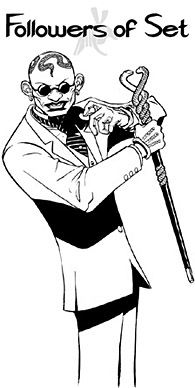 Of course, the clan's very name is proof of such faith. According to most
Setites, their clan founder was none other than the dark god of ancient Egypt,
a hunter without equal in the desert night. Other tales state that Set was an
Antediluvian - at feast - who enshrined himself as a god among the
Egyptians. In either case, Set's rule went unquestioned until he was
challenged by a being named Osiris - whom some call a vampire, and
others something else. Their war lasted for centuries, but ultimately
Set was cast out of Egypt, into the darkness. And yet, his followers
claim, it was in the darkness that wise, ancient Set began his rule in
earnest. Although great Set has vanished from the world, his childer
work to ensure that the world will be in a suitable state for his return - advancing their own schemes in the process, of course.
Of course, the clan's very name is proof of such faith. According to most
Setites, their clan founder was none other than the dark god of ancient Egypt,
a hunter without equal in the desert night. Other tales state that Set was an
Antediluvian - at feast - who enshrined himself as a god among the
Egyptians. In either case, Set's rule went unquestioned until he was
challenged by a being named Osiris - whom some call a vampire, and
others something else. Their war lasted for centuries, but ultimately
Set was cast out of Egypt, into the darkness. And yet, his followers
claim, it was in the darkness that wise, ancient Set began his rule in
earnest. Although great Set has vanished from the world, his childer
work to ensure that the world will be in a suitable state for his return - advancing their own schemes in the process, of course.
To achieve their goals, Setites master several potent tools. To their thinking, the weapons of addiction, seduction and decay are the oldest and finest of means to an end. Setites use drugs, sex, money, power - even vitae and supernatural lore - to draw others into their coils. To date, the Followers' methods have proved terribly effective. Kindred and kine alike succumb to the Setites' charms, gladly doing whatever their new masters bid in return for the Serpents' reptilian patronage. Indeed, in some cities, entire subcultures and economic strata are under one or more Setites' sway.
The Followers of Set cryptically refer to themselves as the "eldest among clans," whatever that phrase may mean to them. Cainite historians dismiss this as groundless braggadocio, citing Set's rise as well past the time of the First City. However, those who listen carefully to the Setites' whispering are somewhat less flippant, as the Snake Clan seems to have access to hoary lore that, some worry, might date back to the first and longest nights of all. A few Serpents have even hinted that Set was thrown into the darkness before Caine himself received his own curse - a theory that most Kindred dismiss, but one with frightening implications nonetheless.
 Whatever the clan's origins, it is a fact that its influence is widespread indeed. Although they
are rare in "traditional" vampiric haunting grounds such as Europe, the Followers of Set prowl
many other areas of the world. They have a potent presence in Africa, particularly in Cairo and
the sub-Saharan area of the continent. They nest in India, just on the edge of the Cathayan
hunting grounds, pursuing the wisdom of destroyer gods and gathering cults to themselves. They
sleep under Middle Eastern sands and rule the Caribbean night. And they go unafraid into the
worst urban hellholes in America. Their web stretches from continent to continent, and the other clans
have yet to realize just how much of the world the Setites have in their clutches.
Whatever the clan's origins, it is a fact that its influence is widespread indeed. Although they
are rare in "traditional" vampiric haunting grounds such as Europe, the Followers of Set prowl
many other areas of the world. They have a potent presence in Africa, particularly in Cairo and
the sub-Saharan area of the continent. They nest in India, just on the edge of the Cathayan
hunting grounds, pursuing the wisdom of destroyer gods and gathering cults to themselves. They
sleep under Middle Eastern sands and rule the Caribbean night. And they go unafraid into the
worst urban hellholes in America. Their web stretches from continent to continent, and the other clans
have yet to realize just how much of the world the Setites have in their clutches.
Nickname: Serpents
Sect: Neutrality is far too valuable for the Followers of Set to bother with sects. They find the Camarilla pretentiously idealistic, and the Sabbat exactly the same. Setites prefer to barter their secrets to both sides, but reserve their truly significant finds for the clan's exclusive use Appearance: Most elder Setites are of Egyptian, North Afri- can or Middle Eastern blood. However, the Snakes have adopted a more egalitarian approach in recent years, and have Embraced men and women of all ethnicities. Red hair is considered a mark of Set's favor, and some neonates are not above hennaing their hair nightly to prove their devotion. Setites usually have impeccable taste in clothing and accessories, and have an inviting, command- ing demeanor that transfixes onlookers.
Haven: Although many younger Setites aren't above snatching the most practical crashspaces possible, the elders of the clan treat haven-building as a reverential process. Many use ancient alchemical rituals to consecrate their havens, be they temples, hidden libraries or simple crypts. Most train cadres of ghouls for the "sacred duty" of guarding the master's haven, and some are fond of letting various snakes roam the interior of their lairs. Their havens are often decorated in ancient Egyptian fashion, but the Followers of Set have become quite multicultural in recent years. An individual Setite may adorn his haven with Ghanan sculpture, Moroccan rugs or Hopi kachinas - whatever suits his tastes or background.
Background: Many Setites served as retainers to other Followers of Set prior to receiving the Embrace. In former nights, the clan chose only those of Egyptian descent, but pragmatism has led them to include those from all ethnicities of late. The Serpents tend to select childer who prove themselves manipulative and; mentally resilient - the former to better sway mortals into: the clan's service, the latter so that the childe can safely learn the knowledge kept by the Followers. The Setites choose only the best; those who are anything less cannot hope to rise above the status of pawn.
Character Creation: Setites tend to focus on Social and Mental Attributes, but their Abilities vary, with the character concept. The Occult Knowledge is common among the clan. Their Natures can be scholarly or bestial, while their: Demeanors are whatever they find appropriate for the occasion. Many have great networks of Contacts, Herd (cultists), Retainers and other pawns willing to do their bidding; exactly what the Setite offers for such service may vary greatly, from blackmail to simple friendship.
Clan Disciplines: Obfuscate, Presence, Serpentis.
Weaknesses: The Setites, as creatures of the most ancient darkness, have a severe allergy to bright lights of all sorts, and sunlight in particular. Add two health levels to any damage inflicted by exposure to the sun. Followers of Set also subtract one from all dice pools while in overly bright light (spotlights, magnesium flares, etc.).
Organization: Individually, Followers of Set act much like other vampires, maintaining herds, acquiring power and suborning rivals. Nor is one Setite automatically immune to the predation of a rival - the clan takes a Darwinian approach even among its own ranks. Communally, though, Serpents usually organize themselves into temples where they can exchange lore and practice their rites. Their hierarchy tends to be organized by age, with the eldest and wisest among them officiating. Rumor has it that somewhere in Africa exists the Grand Temple of Set, the dwelling place of the clan's Dark Hierophant. This Methuselah is said to be the most powerful of Set's personal childer and the first vampire Embraced into the clan; if rumor is correct, his knowledge has no equal, and his authority over the clan is absolute.
Bloodlines: The Serpents have several offshoot bloodlines, most of which derive from alternate interpretations of the dark faith of Set. The Path of the Warrior is one of the most dramatic; these stalkers glorify Set as hunter and warrior, and learn Potence in lieu of Obfuscate. Similarly, the Path of Ecstasy glorifies the pleasures of the flesh offered by the Serpent itself; such vampires seek to master Presence above all other Disciplines. Finally, the Serpents of the Light are a splinter bloodline that nests among the Sabbat. These Cainite? differ from other Setites only in outlook, but practice a code of conduct that the rest of the clan considers heresy punishable by Final Death.
Quote: Please. I'd thought you above such abysmal Judeo-Christian fallacies. "The serpent is not to be trusted." "Knowledge is the source of all evil. " Why do you think parents instill such beliefs in their children - or that your sire reared you in like fashion? Why would they balk at sharing wisdom! Ah. You begin to understand. Would you like to sit and speak with me now?
Stereotypes
Assamite: It seems that our brothers have forgotten all their teachings at the merest taste of a drop of vitae. And what implications this has....
Brujah: They have forgotten more lessons than they've learned. Once worth a touch of respect, now... nothing, really.
Gangrel: Cunning in a savage sort of way, but lacking even the common sense of a wild dog. They have nothing we require, and are valuable only as an,abject lesson in control.
Giovanni: Dangerous rivals, although they balance such crassly material priorities along with their search for enlightenment.
Lasombra: Children of the void, though still fresh from the mother's teat and new-weaned on stolen vitae. Only the eldest among them have any idea of exactly what power they evoke.
Malkavian: Dangerous. They are the keepers of truths perhaps even older than we. Fortunate that the other clans are foolish enough to dismiss the mad ones' prophesying as delusion and rambling; were they wise enough to listen, Set's time might well have come before we were ready.
Nosferatu: A not-so-subtle reminder of what we all are, and why it is pointless to play at anything else.
Ravnos: Concern yourself not with the wandering adolescents of this clan; they are foolish and ignorant of their true lineage. It is the head of the rakshasa that bears watching, and its eyes have opened again.
Toreador: Such ardor is... admirable. I could become drunk on a Toreador's passion, and might drain him dry trying to fill myself with it.
Tremere: How like a precocious child, with spectacles perched so seriously on his nose and a heavy book in his lap! Ah, but this little darling might eventually prove dangerous, and so requires a patent's gentle guidance....
Tzimisce: Self-titled dragons who nonetheless crawl nightly on their bellies and feast on dust. They are crafty, but not so crafty as we.
Ventrue: They dislike us and spread slander against us, for they cannot accept that we are elder and of greater birth than they. Abide a while yet, and their rule will stop persecut- ing us soon enough.
Caitiff: Like the others, save more easily led. Their thin blood betrays the Cainites' essential weakness.
Camarilla: For all its skill at Grafting Masquerades, it cannot see through its own veils.
Sabbat: A frightful mask does not a monster make. It simply makes a victim easier to spot.
Giovanni
The Giovanni are respectful, genteel and well-mannered. Affluent beyond imagination, Clan Giovanni traces its roots back to before the Renaissance, to a family of merchant princes. The clan still maintains its original home in Venice, in a thousand-year-old loggia just outside the heart of the city. No other clan makes such a spectacle of humility and propriety as does the Giovanni. And no other clan hides its blasphemous secrets as well.
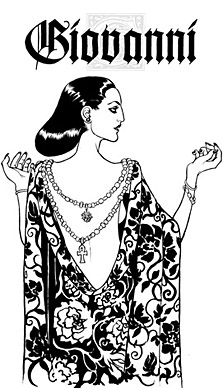 According to tales whispered in Camarilla salons and Sabbat
esbats, the Giovanni's money spoiled the family, and the Venetians
turned to nigrimancy out of perverse boredom. Surprisingly enough, the
family demonstrated a great
aptitude for trafficking with the
dead, and their newfound abilities
caught the eye of a forgotten Antediluvian. The
vampire Embraced the head of
the family, Augustus Giovanni,
and brought him into the world
of the Damned. This particular
Antediluvian, the legends say,
had a profound interest in death,
and the Embrace of Giovanni and
his family was intended to further
the vampire's knowledge of what lay
beyond the wall of mortality.
According to tales whispered in Camarilla salons and Sabbat
esbats, the Giovanni's money spoiled the family, and the Venetians
turned to nigrimancy out of perverse boredom. Surprisingly enough, the
family demonstrated a great
aptitude for trafficking with the
dead, and their newfound abilities
caught the eye of a forgotten Antediluvian. The
vampire Embraced the head of
the family, Augustus Giovanni,
and brought him into the world
of the Damned. This particular
Antediluvian, the legends say,
had a profound interest in death,
and the Embrace of Giovanni and
his family was intended to further
the vampire's knowledge of what lay
beyond the wall of mortality.
The Ancient's plan worked better, albeit differently, than he'd intended. Augustus, a cutthroat and mercenary merchant, saw the opportunity to seize his doddering sire's power and did so, hunting and killing all of the Antediluvian's descendants as well. After drinking the Ancient's blood, Augustus became a member of the Third Generation and founded his own clan, the Giovanni.
Other vampires reacted in horror, and, for a century, the "Devil Kindred" Giovanni were rooted out and destroyed wherever they went. Finally, the Giovanni sat down with the newly formed Camarilla and formed a mutual truce. This truce guaranteed the Giovanni would not participate in the Jyhad and would leave other vampires to their affairs. The Giovanni agreed, thus averting the genocide they surely would have otherwise met.
Taking advantage of other vampires' lack of involvement with them, the Giovanni quietly continued to amass wealth and power, practicing their Discipline of Necromancy all the while. Few believe the clan is engaging in either practice for altruistic purposes, and recent global movements by the Giovanni have many Kindred worried. With all that money and all those harvested souls, something is on the horizon; it is an ill wind that blows out of Venice.
 Members of the Giovanni clan are also members of the
Giovanni family, and those not Embraced often serve their
Kindred relations as ghouls. This familial tie - members of the
clan are related by blood twice - ensures complete loyalty on the
part of the Giovanni. While concentrated primarily in Europe,
the Giovanni have recently been expanding into, the world
market, and the clan seems to be more prolific in recent nights.
Members of the Giovanni clan are also members of the
Giovanni family, and those not Embraced often serve their
Kindred relations as ghouls. This familial tie - members of the
clan are related by blood twice - ensures complete loyalty on the
part of the Giovanni. While concentrated primarily in Europe,
the Giovanni have recently been expanding into, the world
market, and the clan seems to be more prolific in recent nights.
Nickname: Necromancers
Appearance: Giovanni vampires typically maintain airs of presentability and respectability. Most Giovanni, hailing as they do from the Italian branch of the clan, bear European features, including fair-to-dark complexions, dark hail and solid statures, Giovanni tend to dress well but not lavishly, preferring subtle accouterments of affluence to ostentatious displays.
Haven: Giovanni favor havens befitting their wealth. Mansions, palatial homes and well-appointed apartments suit the Giovanni best, though uncommon is the Necromancer who doesn't keep a backup haven in a sewer or graveyard. Some Giovanni involve themselves in medical power structures and make their havens in hospitals, where plenty of coyer exists and precious blood may be taken at a whim.
Background: Most Giovanni come from the ranks of the Venetian family and have spent much of their mortal lives as ghouls in service to another family member. As closely knit as the family is, rivalry and treachery are rampant among the clan, as each member tries to assert his superiority over others. Amazingly versatile for having such a finite pool from which to draw new Kindred, the Giovanni may Embrace any individual who shows particular promise, but only after a "trial period" of ghouldom known as the Proxy Kiss.
Character Creation: Giovanni typically have professional concepts, the better to fund the clan's endeavors. Their Natures and Demeanors tend toward the crafty and selfish, though perversity festers in the incestuous family, and many are Deviants. Mental Attributes and Knowledges are primary, and Backgrounds are greatly prized. Almost all Giovanni possess a comfortable level of Resources, and many claim Retainers, Contacts and Influence.
Clan Disciplines: Dominate, Necromancy, Potence.
Weaknesses: The Giovanni Kiss causes excruciating pain in mortals who receive it. In fact, the bite of a Giovanni vampire often kills its mortal victim from shock before the poor soul has a chance .to die from blood loss. The Necromancers do twice as much damage as any other vampire to mortals (and only mortals) who suffer their Kiss. Thus, if the Giovanni in question took one blood point from a mortal vessel, that vessel would suffer two health levels of damage. As such, Giovanni vampires are quite likely to feed from already dead corpses or from resources like hospital blood reserves.
Organization: Giovanni clan affairs are handled in Venice, in a vast loggia colloquially known as the Mausoleum. As is to be expected, the clan has a familial structure. Incest, necrophilia, favor-currying, ancestor worship and carefully cultivated guilt riddle the family; by the time most Giovanni Kindred are Embraced, they've seen more than enough to inure them to the vagaries of undead existence. The clan's nonintervenrion in the Jyhad allows members to focus on their own vendettas and better their knowledge of Necromancy. The Giovanni Antediluvian, Augustus Giovanni, reportedly still maintains direct control over the clan, though none outside the clan is known to have seen him in the past 400 years.
Bloodlines: The Giovanni do not have antitribu - they are all loyal to the family as a whole, if not individual members. However, the clan has brought several other families into its fold. These include the Pisanob (Central and South American witches), the Dunsirn (Scottish bankers who practice cannibalism), the Milliners (a prominent New England family dating back to the turn of the 20th century) and a host of minor families. Not all Giovanni are surnamed Giovanni.
Quote: Consider taking a different tone with me. You are, after all, worth as much to the Giovanni dead as you are undead.
Stereotypes
Assamite: Their recent change in disposition makes me nervous.
Brujah: So much noise, and yet so little signal.
Followers of Set: Although they hail from the lands of the dead, there is little we can glean from them without tainting ourselves in the process.
Gangrel: Ultimately forgettable; we rarely cross paths.
Lasombra: They'll stab you in the back, but that's because they know how Kindred games are played.
Malkavian: The insight they offer is rarely worth the excruciating company they provide; I wonder if the "madness" is a simple sham to reduce their foes' defenses.
Nosferatu: This blighted clan has proved dangerously adept at uncovering secrets. Make no enemies among them, lest: you became the subject of their attentions.
Ravnos: No good can come of a Kindred who claims lies as his sire.
Toreador: Effete and indolent, the Toreador nonetheless wield appreciable assets.
Tremere: Slippery as eels, the Tremere are guilty of the same crime as we, yet they mire themselves in the same politics that damn them.
Tzimisce: An arcane, if outdated, evil.
Ventrue: They spend too much time cultivating their image as martyrs to get involved with something that truly matters; they lack direction.
Caitiff: Inconsequential and poorly bred; they are more mosquito than vampire.
Camarilla: Large, foolish and predictable. Like American government.
Sabbat: Smaller, more foolish and less predictable. Like Italian government.
Ravnos
If ever a clan was renowned for a wickedly black sense of humor, the Ravnos would be that clan. These Cainites are deceivers of the first order, weaving illusion and lies into elaborate schemes to part the foolish from whatever it is the Ravnos might fancy - be it wealth, blood or even their victims' freedom. Like Mephistopheles or Old Scratch, the Ravnos ply their devil's deals with whomever they choose, be it human or Kindred, and woe to those who wind up unable to pay the hidden costs.
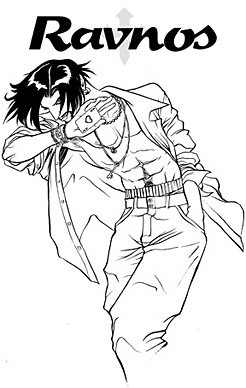 Although many Ravnos see themselves
as great tricksters, the generally benevolent
tricks of Coyote and Raven aren't so much
their style. Instead, they draw on a tradition
of illusion and deceit inherited from the
rakshasas and ghuls of the Middle and Far
East. A Ravnos is a highly dangerous being
with whom to sup or bargain. And these devils have
been making their wagers and bargains for a long time indeed
The Ravnos are nomadic to the core and care little for
permanent havens or positions in a city's established power structure. Even those who have chosen a given city for their home tend
to establish and abandon havens as the mood strikes them, taking
whatever lairs they like, doing as they please, and moving on when
bored. This habit infuriates princes across the world, who resent the
Ravnos' disregard for the Tradition of Hospitality. Few punish
violators, though, for fear drawing the malice of the clan as a whole.
Although many Ravnos see themselves
as great tricksters, the generally benevolent
tricks of Coyote and Raven aren't so much
their style. Instead, they draw on a tradition
of illusion and deceit inherited from the
rakshasas and ghuls of the Middle and Far
East. A Ravnos is a highly dangerous being
with whom to sup or bargain. And these devils have
been making their wagers and bargains for a long time indeed
The Ravnos are nomadic to the core and care little for
permanent havens or positions in a city's established power structure. Even those who have chosen a given city for their home tend
to establish and abandon havens as the mood strikes them, taking
whatever lairs they like, doing as they please, and moving on when
bored. This habit infuriates princes across the world, who resent the
Ravnos' disregard for the Tradition of Hospitality. Few punish
violators, though, for fear drawing the malice of the clan as a whole.
Although the clan has long-standing ties with the Gypsies, few Ravnos enjoy the hospitality of their mortal kin. Perhaps the Gypsies know these vampires' true natures too well, and are loath to offer friendship to the undying. Perhaps the Ravnos themselves alienate their mortal families through their dangerous tricks. Whatever the reason, a Ravnos typically has no allies he can rely on regularly. His charm may win him a few temporary companions, and clan loyalty may draw fellow Ravnos to his side in times of dire need, but the vampire's path ultimately lies alone
Naturally, the princes of many cities are leery of allowing such tricksters free rein in their domains. The Ravnos' eccentric code of honor is strong, but rarely coincides with another Kindred's definition of the term. A Ravnos may break her word at will, unless she's spit in her palm and shaken on the deal. She'll defend her "good name" for all it's worth - depending on what she considers slander. And she'll usually come to the defense of a clanmate, and vice versa; the Ravnos may take advantage of one another, but they consider it their privilege. Outsiders aren't allowed the same.
 Perhaps the most worrisome thing about the Ravnos is that as a clan, they managed to survive for centuries
in Asia, where most Kindred are quickly hunted down and devoured by the ruthless Cathayans. No other
Cainites know exactly how they managed this - but now a possible reason is emerging. Rumors filter back to
Europe and the Americas of elder things awakening, of ancient vampires shrugging off the earth of millennia
and throwing the Cainite courts into disorder. These elder Ravnos - if rumor speaks correctly - have demonstrated terrifying mystical powers, including a talent for illusions
so powerful they can affect the physical world. Time can only tell what
part the reemergence of these "demon kings" will play in the Jyhad.
Perhaps the most worrisome thing about the Ravnos is that as a clan, they managed to survive for centuries
in Asia, where most Kindred are quickly hunted down and devoured by the ruthless Cathayans. No other
Cainites know exactly how they managed this - but now a possible reason is emerging. Rumors filter back to
Europe and the Americas of elder things awakening, of ancient vampires shrugging off the earth of millennia
and throwing the Cainite courts into disorder. These elder Ravnos - if rumor speaks correctly - have demonstrated terrifying mystical powers, including a talent for illusions
so powerful they can affect the physical world. Time can only tell what
part the reemergence of these "demon kings" will play in the Jyhad.
Nickname: Deceivers
Sect: The Ravnos go where they will and deal with whomever they will, and sects be damned. The elders of the clan, particularly those centered in India, scoff at the Camarilla and Sabbat as temporary social clubs at best, hollow institutions where paranoid vampires can gather in numbers and reassure themselves that they are the apex of the food chain. The younger ones simply rejec idea of giving any outsider even a fraction of authority Most Ravnos look at the Sabbat's promises of freedom and the Camarilla's offer of protection as nothing more for the trap, and politely (or not so politely).
Appearance: Many younger Western descent, usually of dark complexion, with darker Slightly rarer are those with Asian, African or Nordic rarer still are those without even a trace of Gypsy European Ravnos do not Embrace gorgio (non-Gypsies).
The Eastern half of the clan is mostly of Indian blood, members have Embraced promising men and women ethnicities. Like their Western cousings, they favor colorful and beautiful clothing, and enjoy practicing their allure on mortals.
Haven: Ravnos are nomadic by nature; even their Eastern childer feel the wanderlust upon them from time to time. Members of the clan often travel in vans or RVs, taking shelter wherever they may. Those with mortal relatives, particularly Gypsies, often stay with their families for a while. But when the local Kindred start getting uncomfortably curious, the Ravnos are on the road again.
Background: The nomadic vampires Embrace despite the swelling herds of humanity. The youngest however, are fairly indiscriminate in siring childer, and generations have seen Ravnos from all cultures and ethnicities.
Those Ravnos neonates without Indian or Gypsy blood typically demonstrated great facility for misdirection, barter and mischief in life. The Devil has a sharp eye for his own.
Character Creation: Ravnos typically have concepts, and their Demeanors can change as required by the situation. They tend toward primary Social as well as primary Talents. Many have high either in the form of ancestral treasures or as accumulated hoards of ill-gotten rare goods and objects of art.
Clan Disciplines: Animalism, Chimerstry, Fortitude.
Weaknesses: The Ravnos have indulged in their particular vices so long that they have become addicted to them. Each Ravnos has a weakness for some form of trickery, deceit or mischief, whether it be gambling, lying, theft, blackmail or even cleverly framed murder. When the opportunity to indulge presents itself, a Ravnos must make a Self-Control roll (difficulty 6) or succumb to her compulsion.
Organization: Most Ravnos trust nobody, not even their own clanmates, but work together when necessary to bilk, rob or topple an outsider enemy. They often make grandiose pledges of family loyalty to one another, although neither party expects very much to come of the vows.
The recently awakened clan elders, however, are beginning to contact Ravnos on all continents. Although the typically chaotic clan structure has yet to see any real change, it may be only a matter of time before the Ancients' will becomes manifest through the younger Ravnos.
Bloodlines: The Ravnos are divided among family lines, mimicking the family lineages of their Gypsy kin. Among their families are the Phuri Dae, who often focus on Auspex rather than Fortitude; the Urmen, who claim their blood is more eldritch than most and focus primarily on Chimerstry; and the Vritra and Kalderash, who are said to maintain black pacts with the deadly Cathayans.
Quote: If it'd been me stealing the sun, I wouldn't have given it to the humans to keep them warm. I'd have drowned it in the ocean and started buying the kine's souls by setting them fire.
Stereotypes
Assamite: They've become even worse ghuts than ever before. The only good thing about them is that now the other clans hate and fear them so much that you can easily get plenty of cold bodies between yourself and one of these devourers.
Brujah: Go ahead and let them rattle their cages. If they bend the bars, we'll follow them out - and if the zookeeper shows up, they're the first to go.
Followers of Set: What is everyone so afraid of? Even a deal with the Devil isn't so bad if you read the fine print. Snakes can't poison me, and I don't have a soul to lose. Then again, if thought the same as me, I wouldn't have "preferred customer" status. So let 'em cringe.
Gangrel: Ourpoor cousins, if that's possible. They dig themselves holes in the mud and drag their matted asses into the city only when the Camarilla whistles 'em up. Lapdogs gone feral, and who needs that kind of pet? Giovanni: A family as much as a clan, same as us. Give 'em space, and maybe they'll do the same. If they don't, pack 'em off to hell. They'll be happiest there, anyway.
Lasombra: They look pretty soft, but these are some hard bastards, that's for sure. They ain't the new kid on the block, and they don't play kid games. (shrug) You gotta respect that.
Malkavian: They see too damn much and don't buy into anybody's delusions but their own. Don't like them, not one bit.
Nosferatu: Their eyes and ears are just too damn sharp for their own good. Be a shame if something... happened to those catacomb crawlers.
Toreador: Poet shirts, wine and roses, leather jackets, artsy tattoos. Kill me if I ever start acting like one of those limpdicks.
Tremere: Our fellow sorcerers, conjuring up solid results to own hadows. Of course, they haven't half the edge we do - I'd be more afraid of my cousin's ghost-fire than the clumsy pyrotehnics of a Warlock.
Tzimisce: There are some real impurities in these bitches' blood. I say Caine took a shine to a monster some time ago, and the Tzimisce are the result.
Ventrue: Bow if you have to, scrape if you must, and slit their throats for the blood if you can.
Caitiff: Like suckers, there seems to be one born every minute.
Camarilla: Everything we need, boxed up like a Christmas present.
Sabbat: They claim to love their existence. Amazing, then, how much their actions smack of self-loathing.